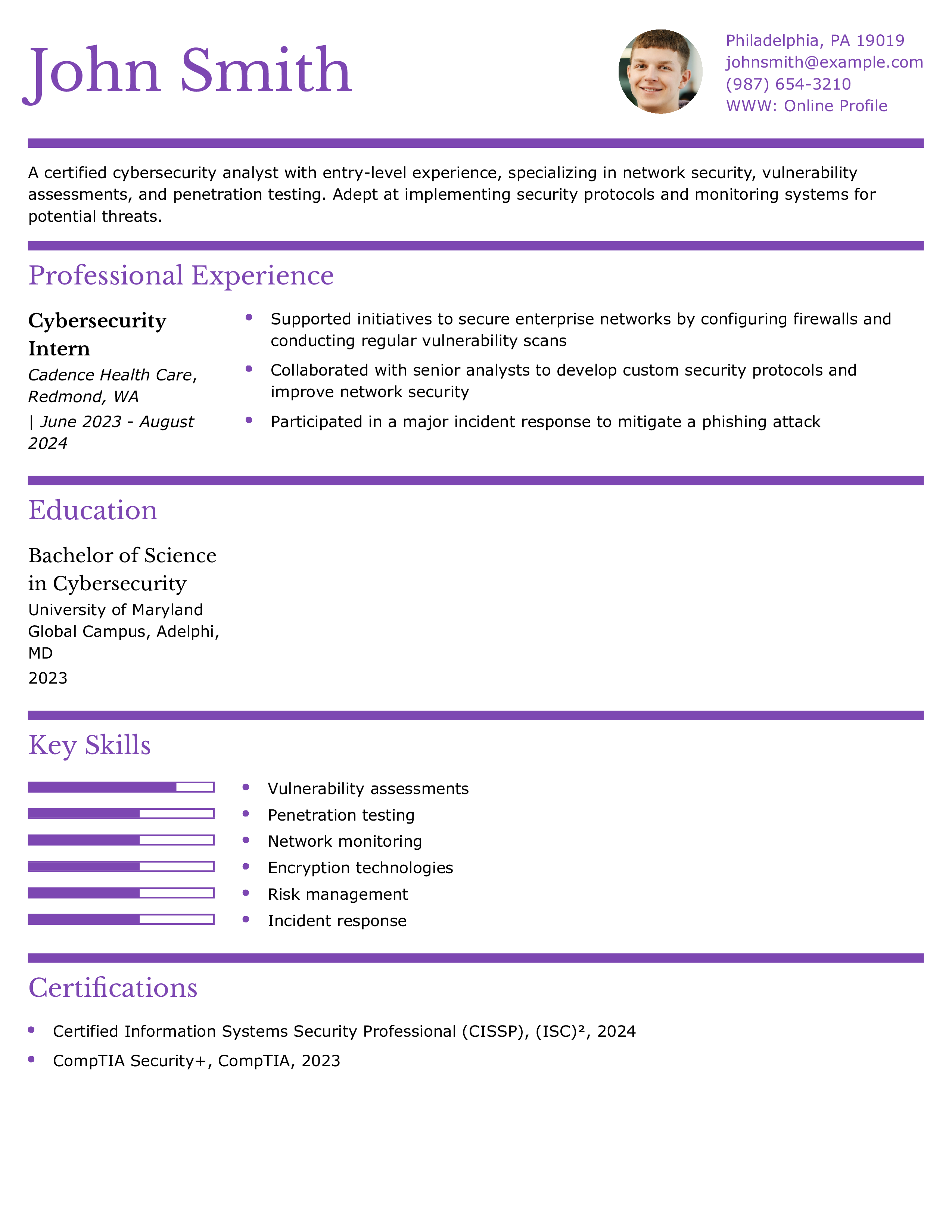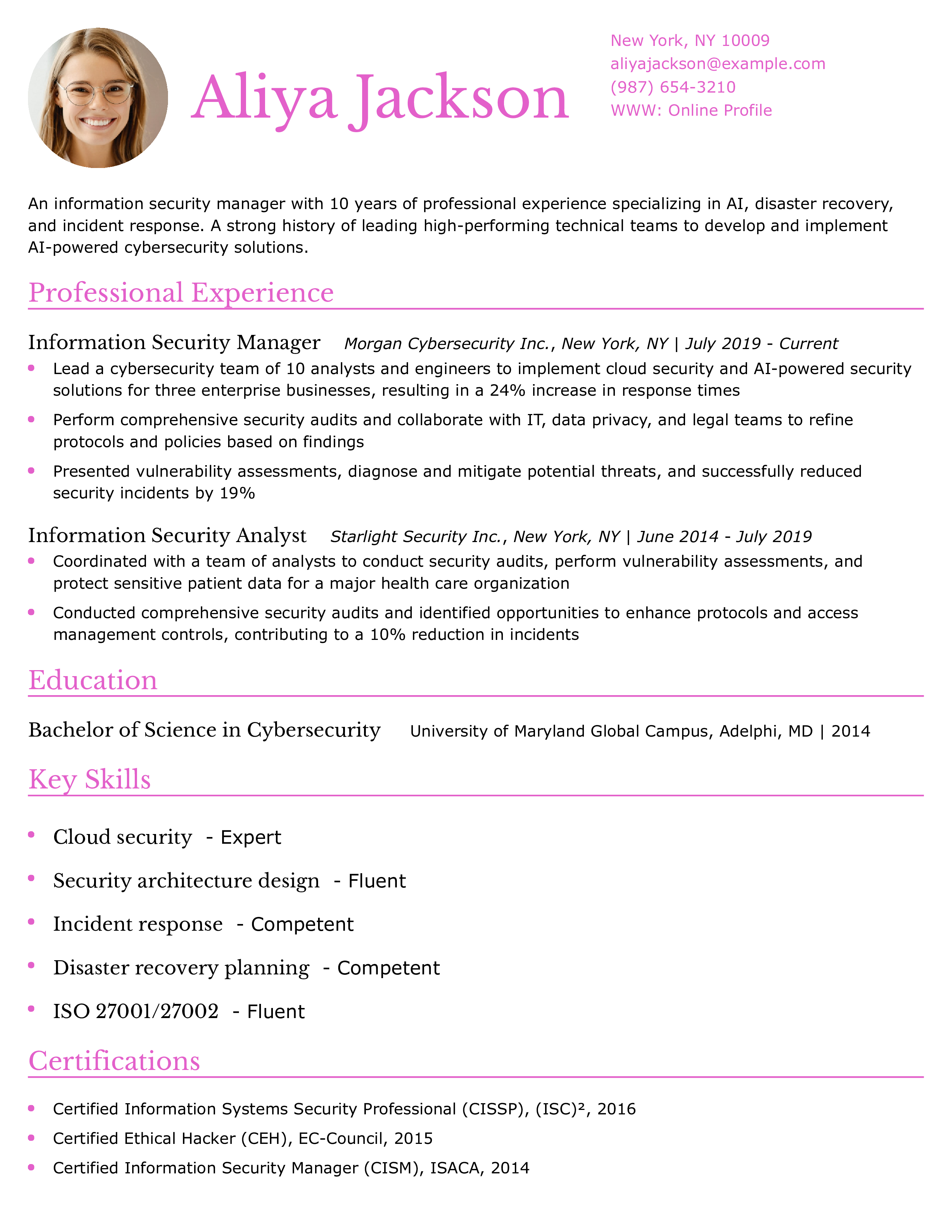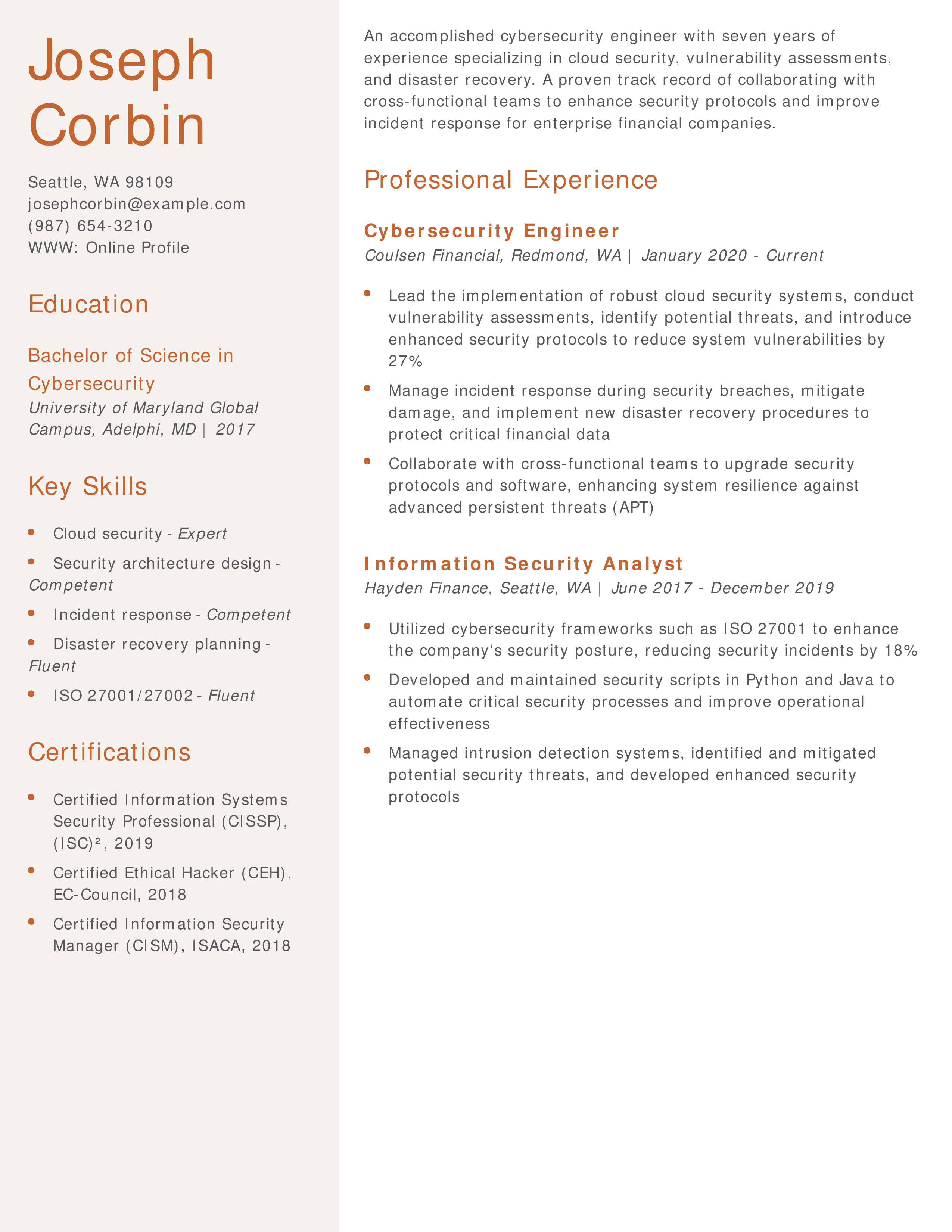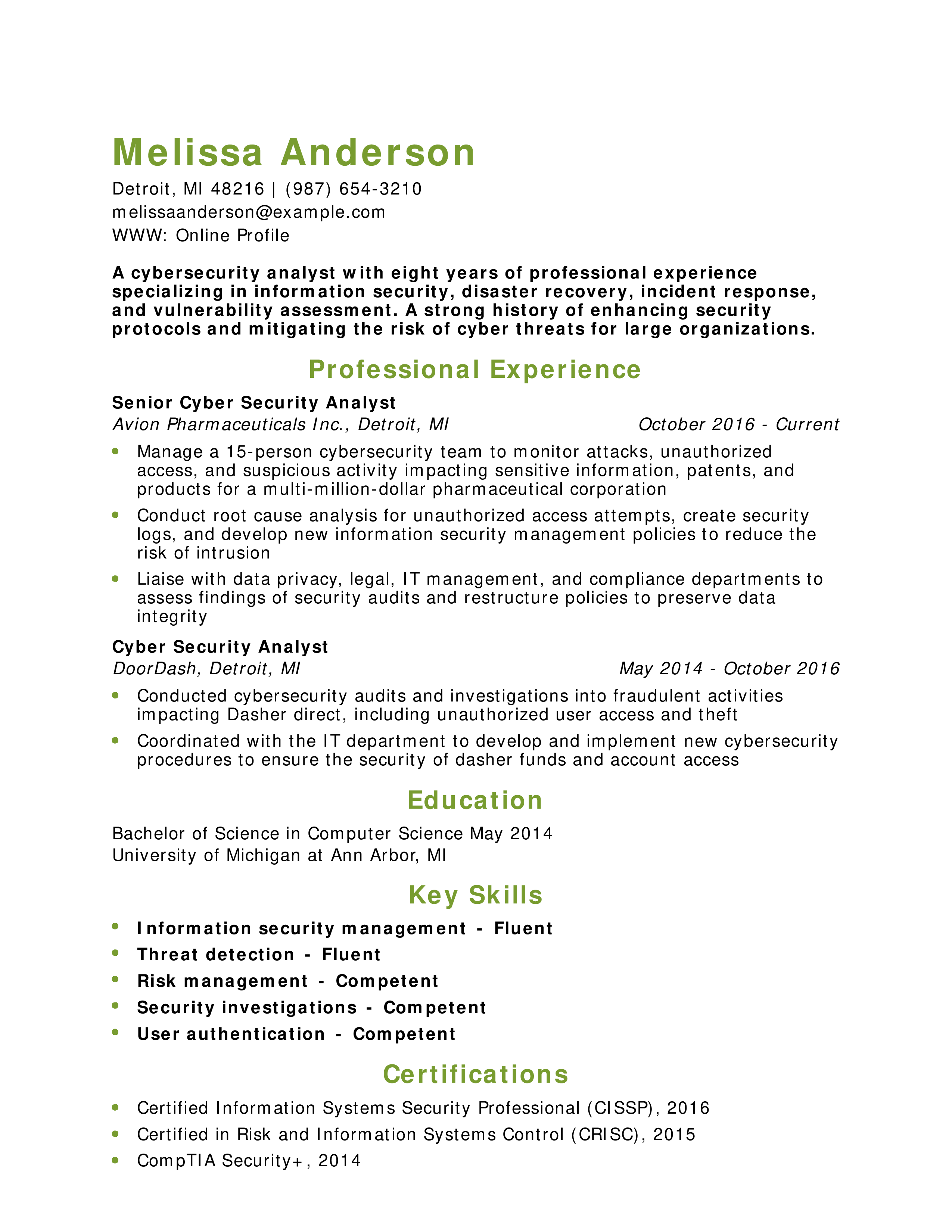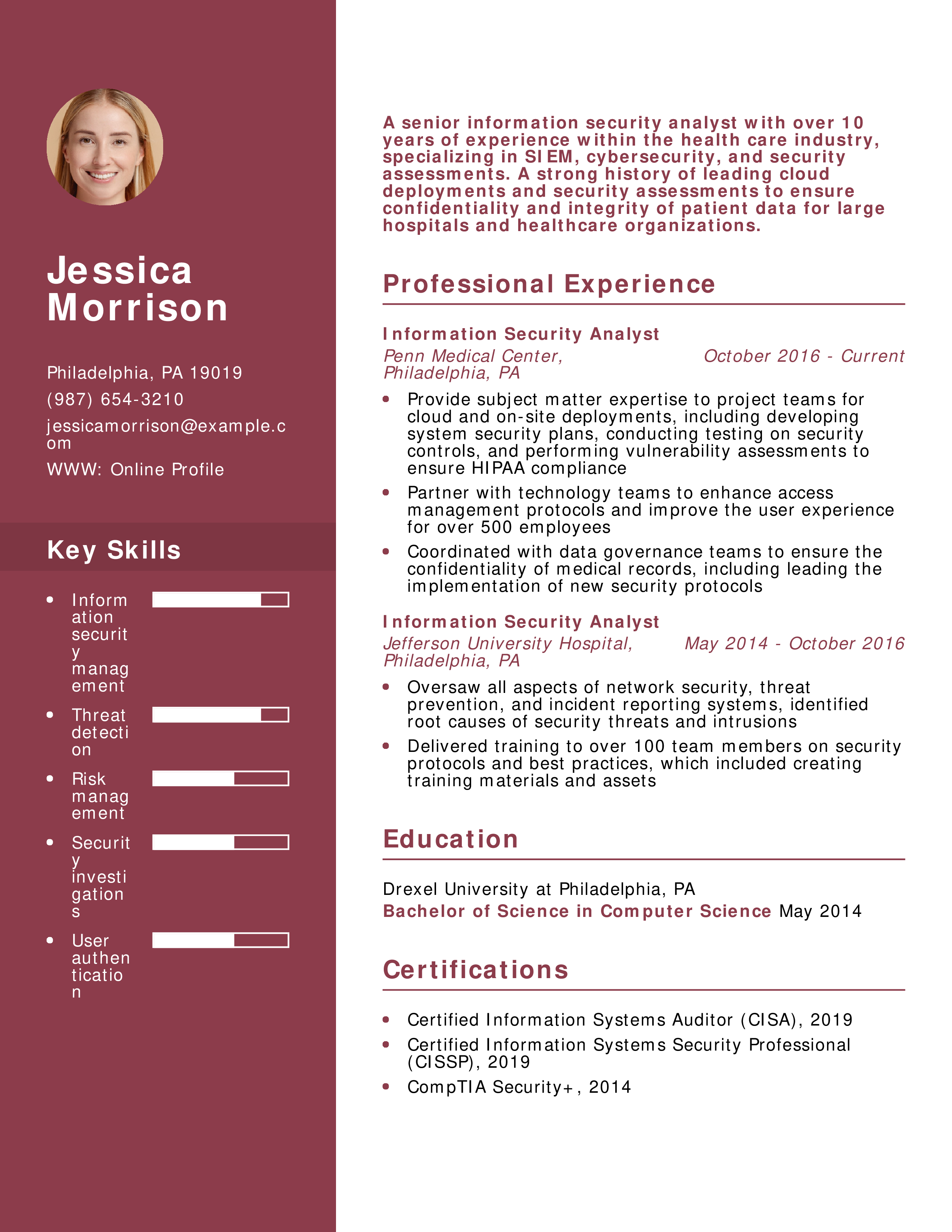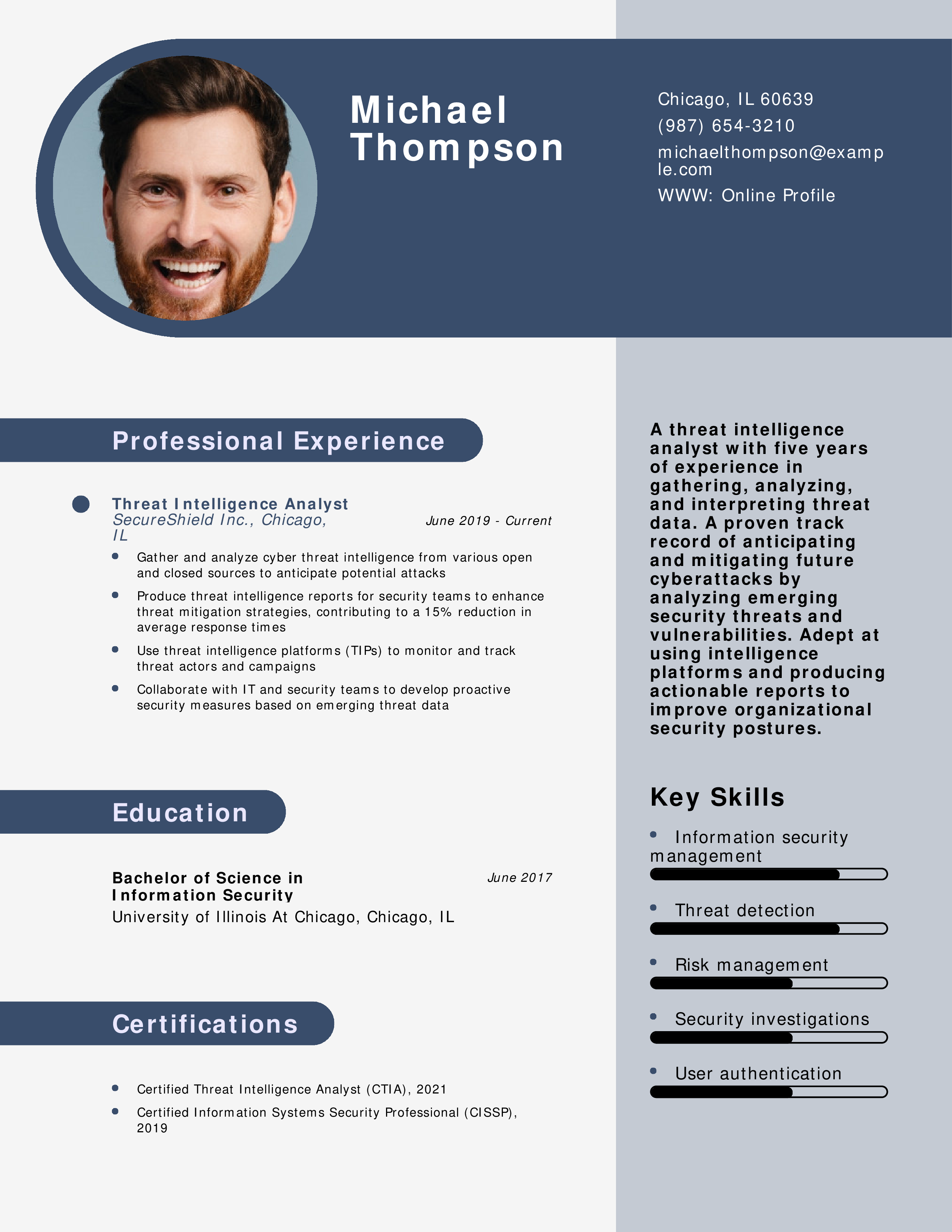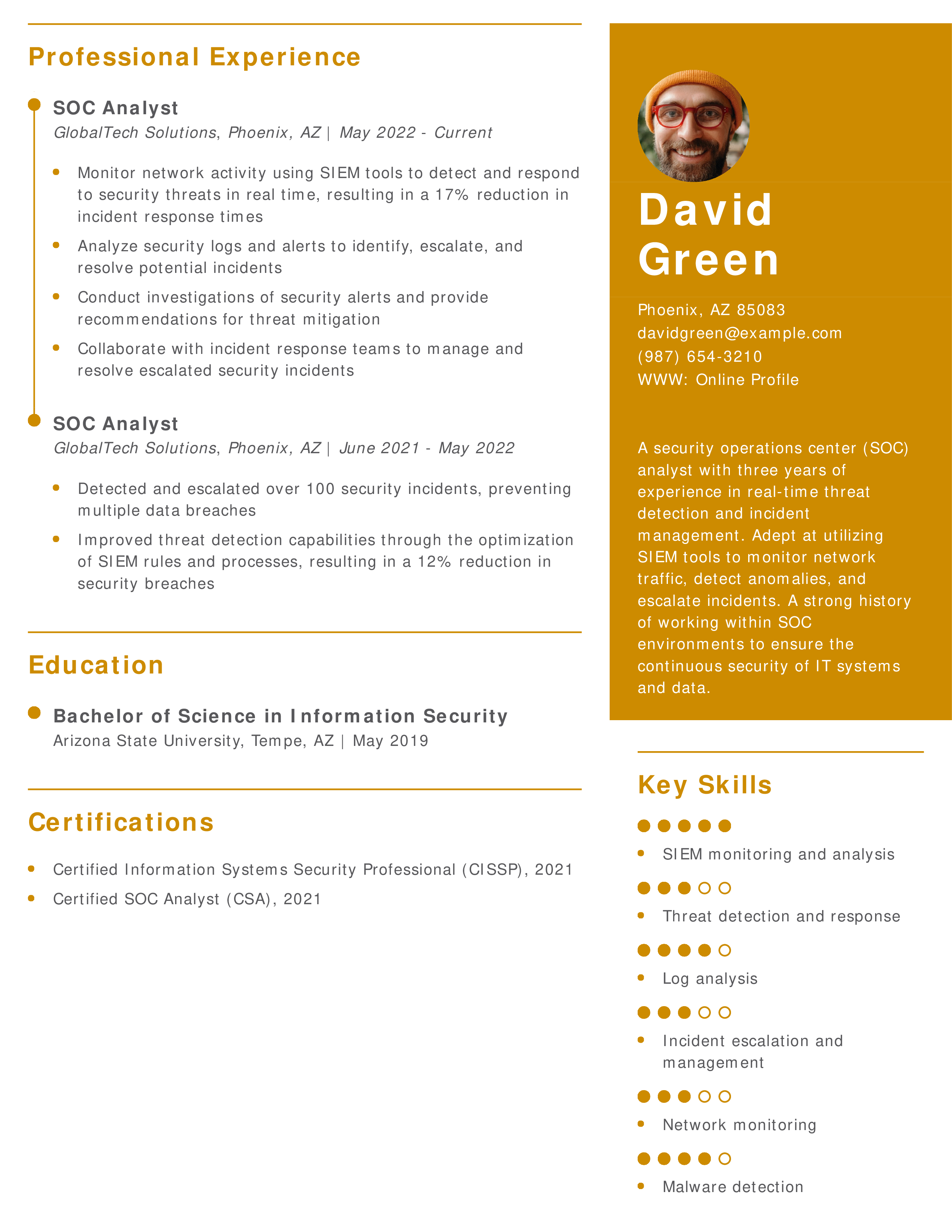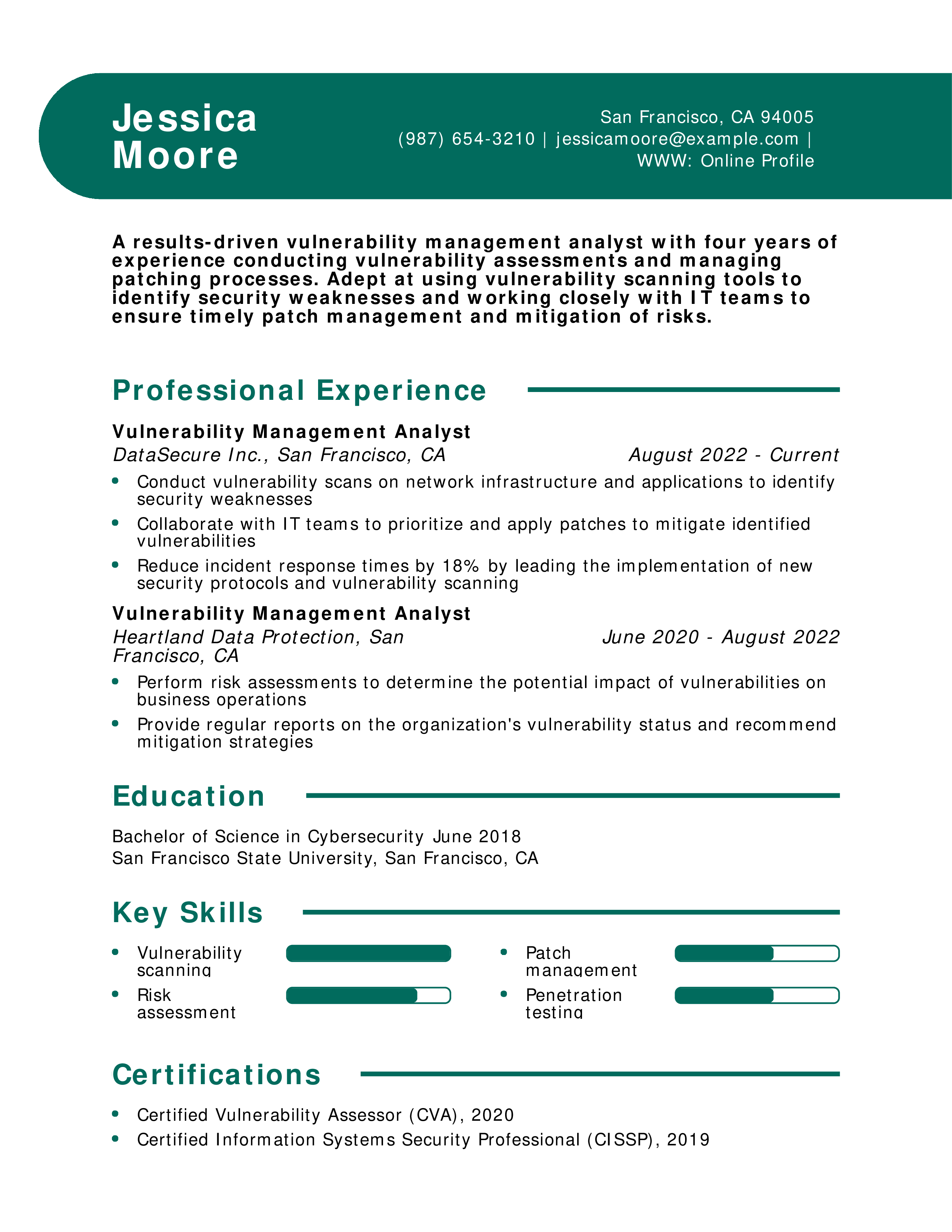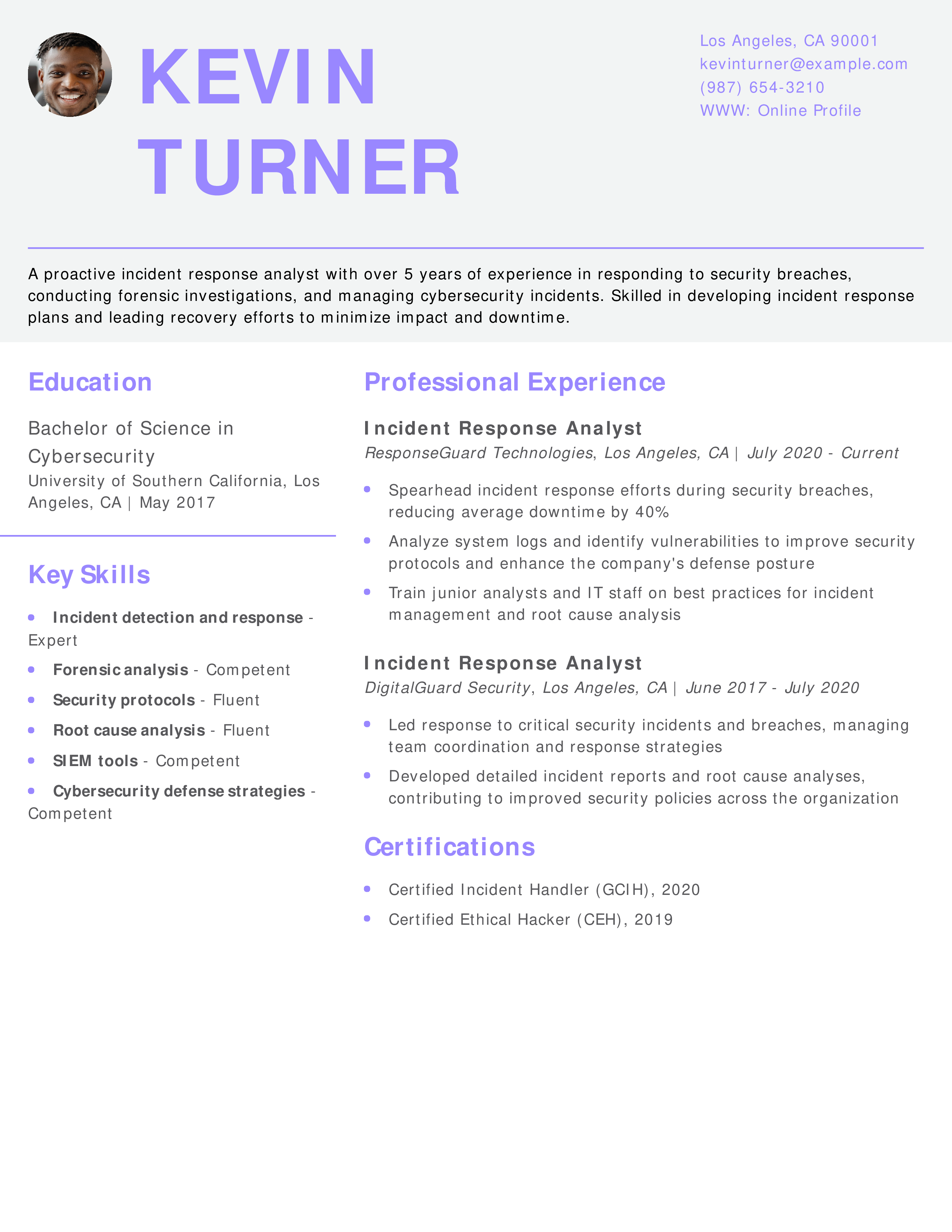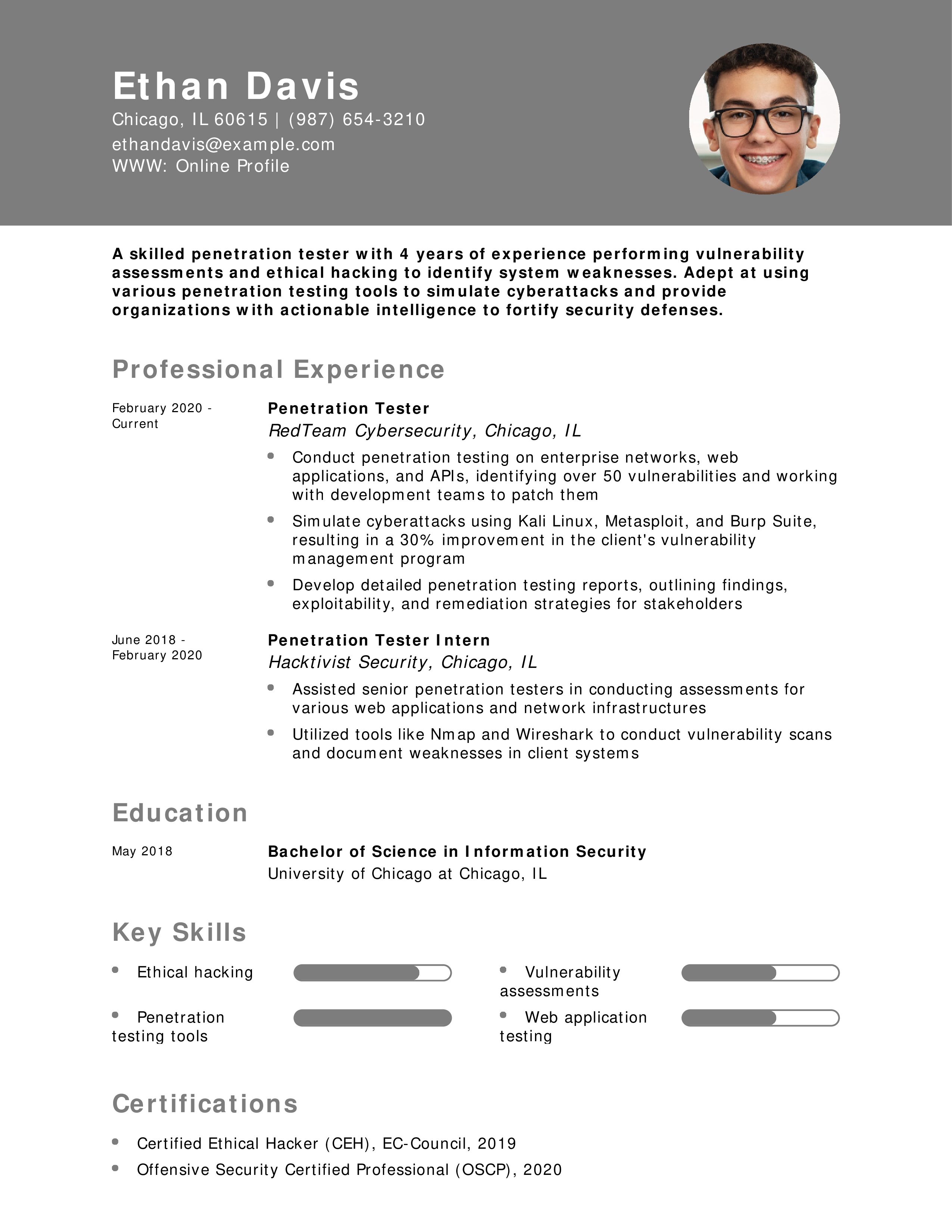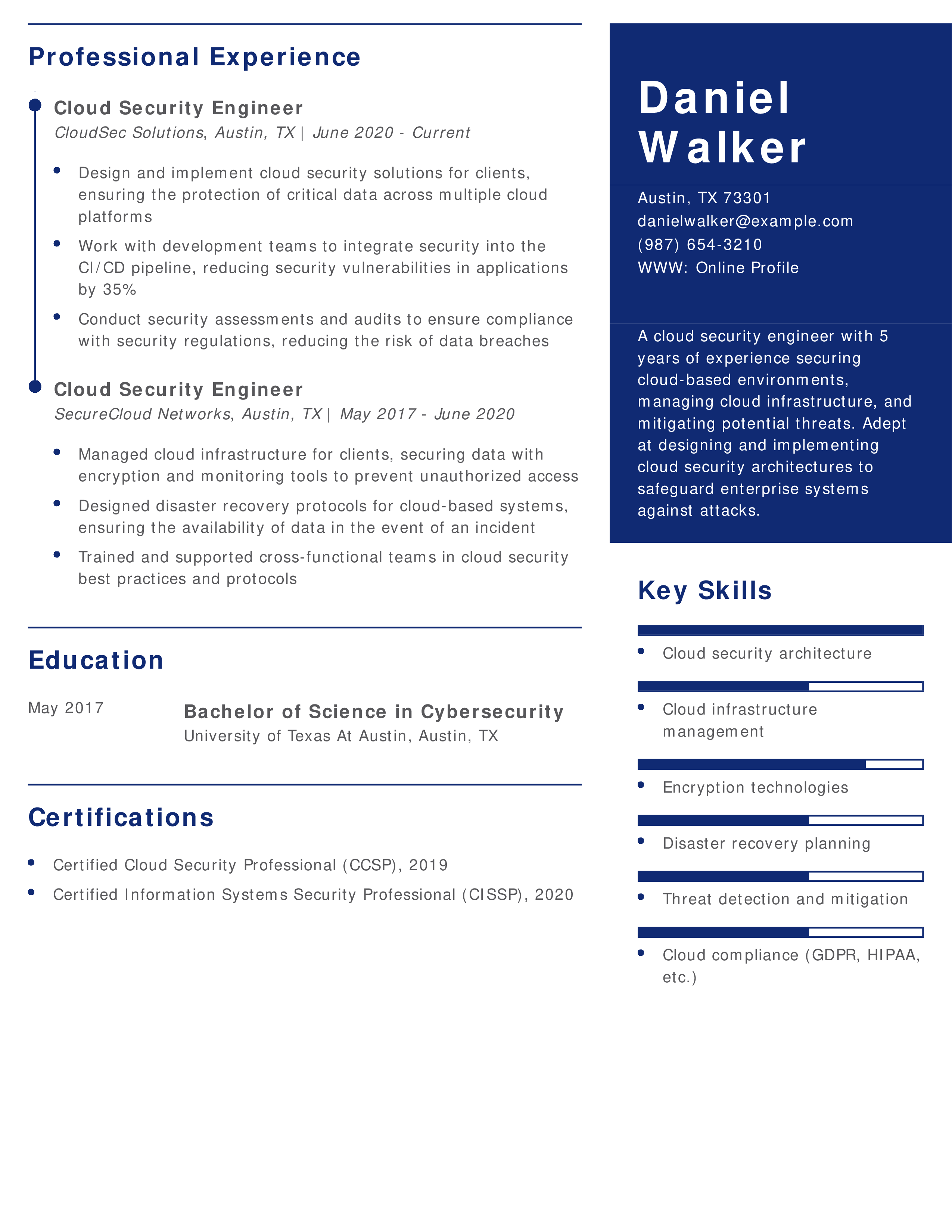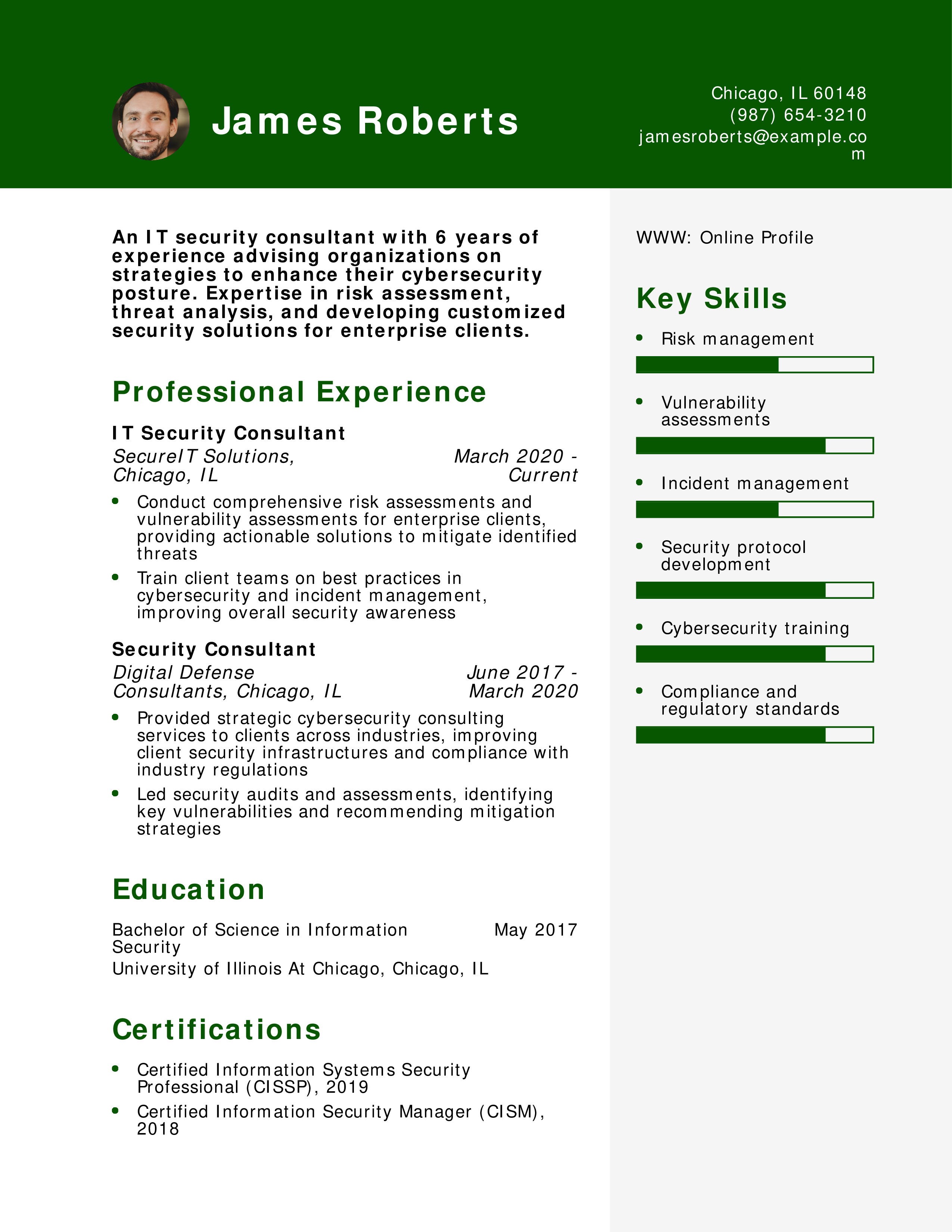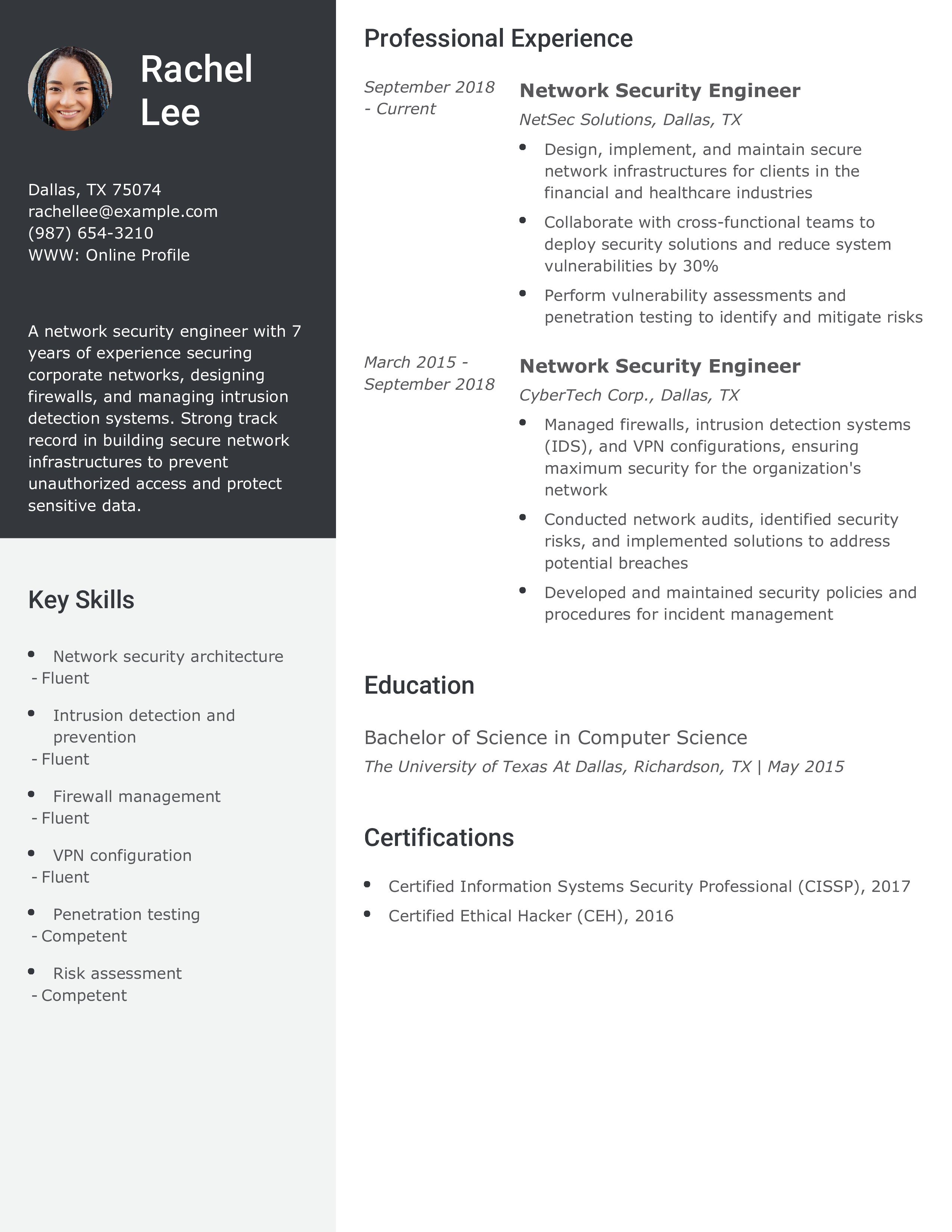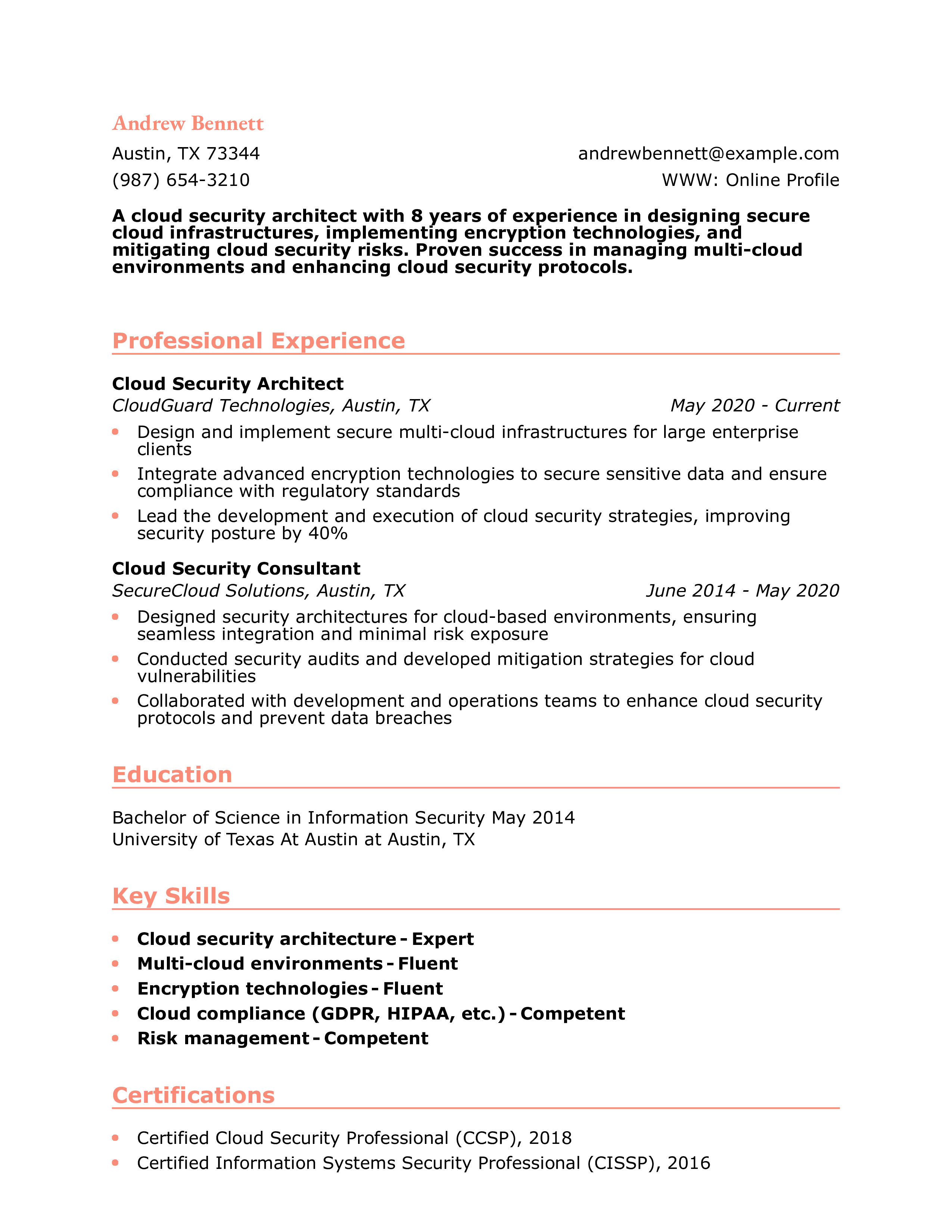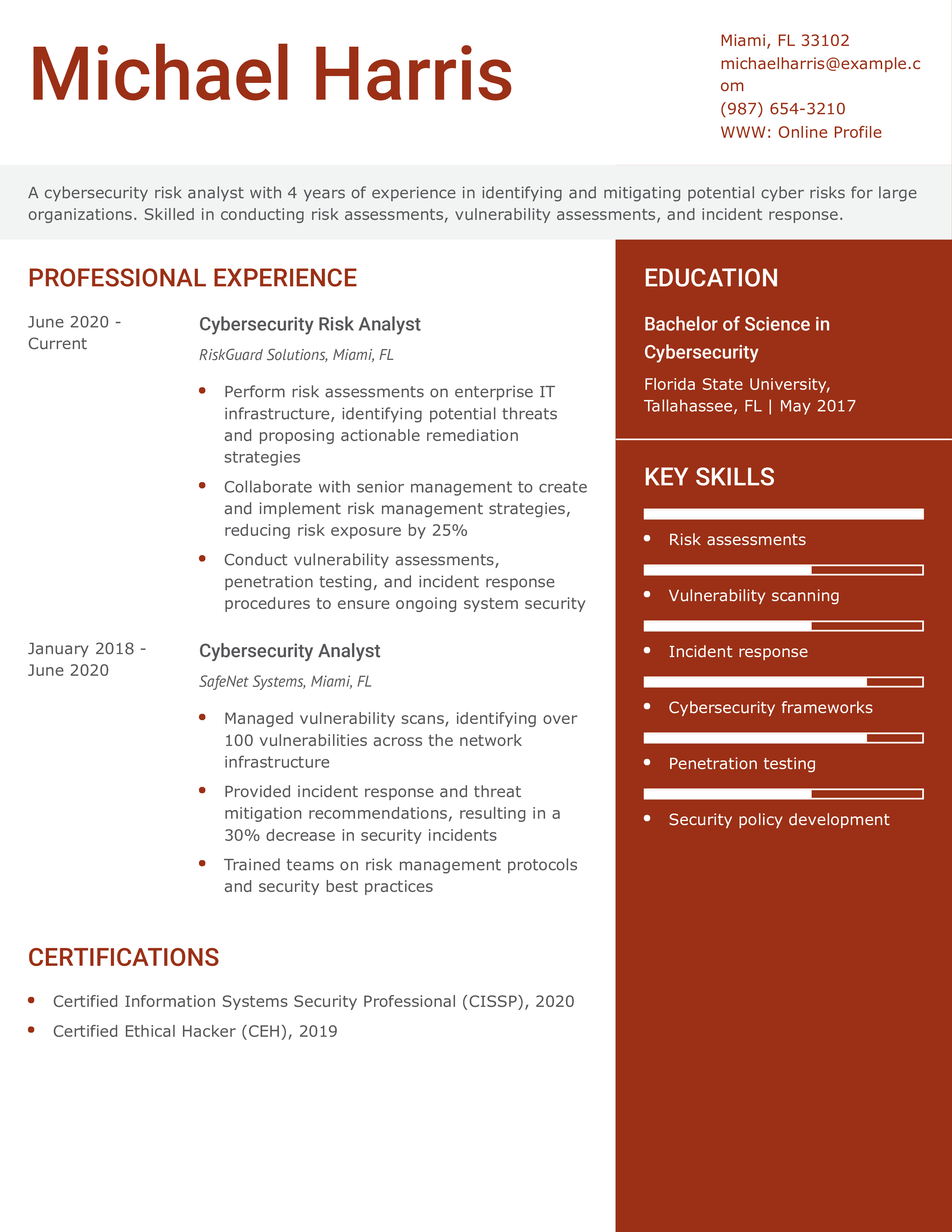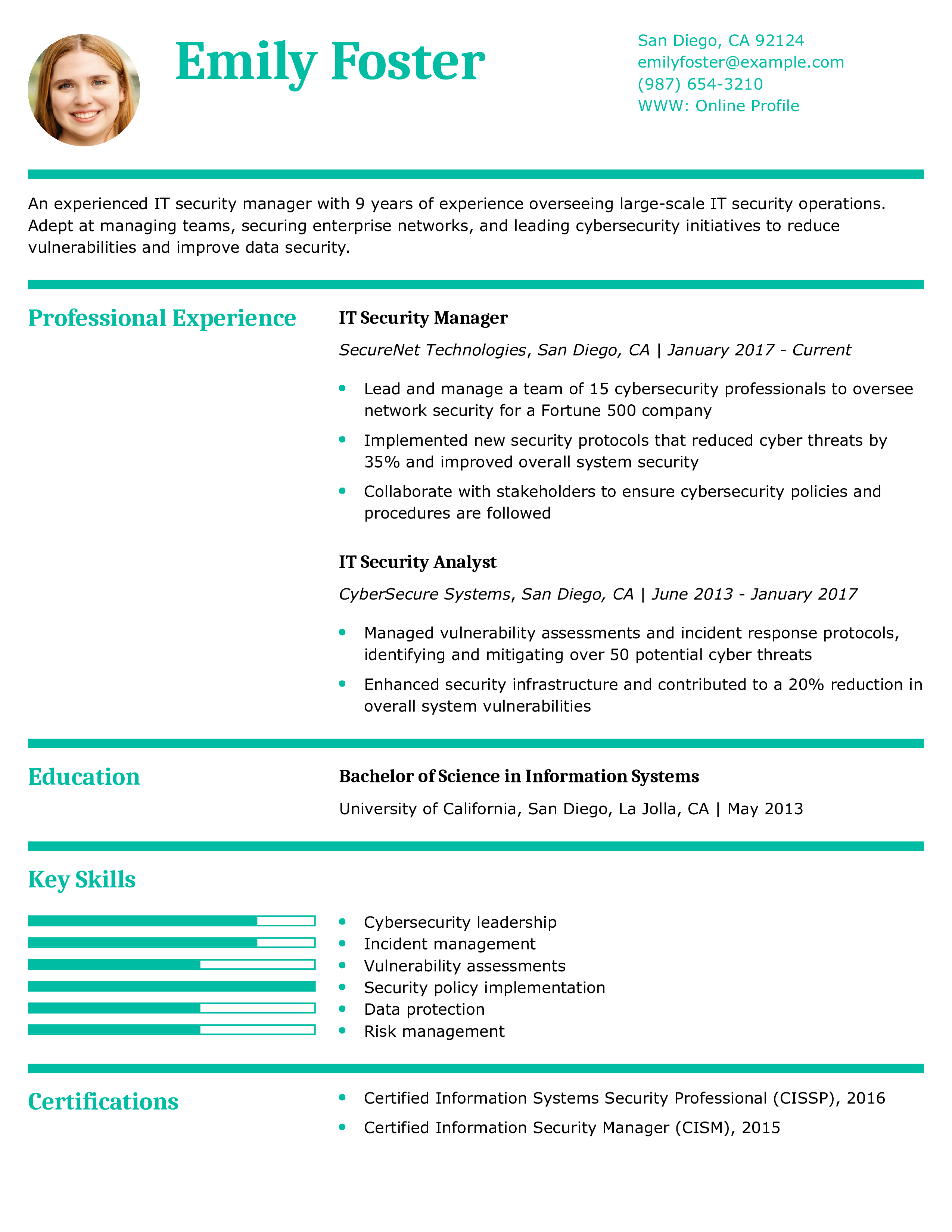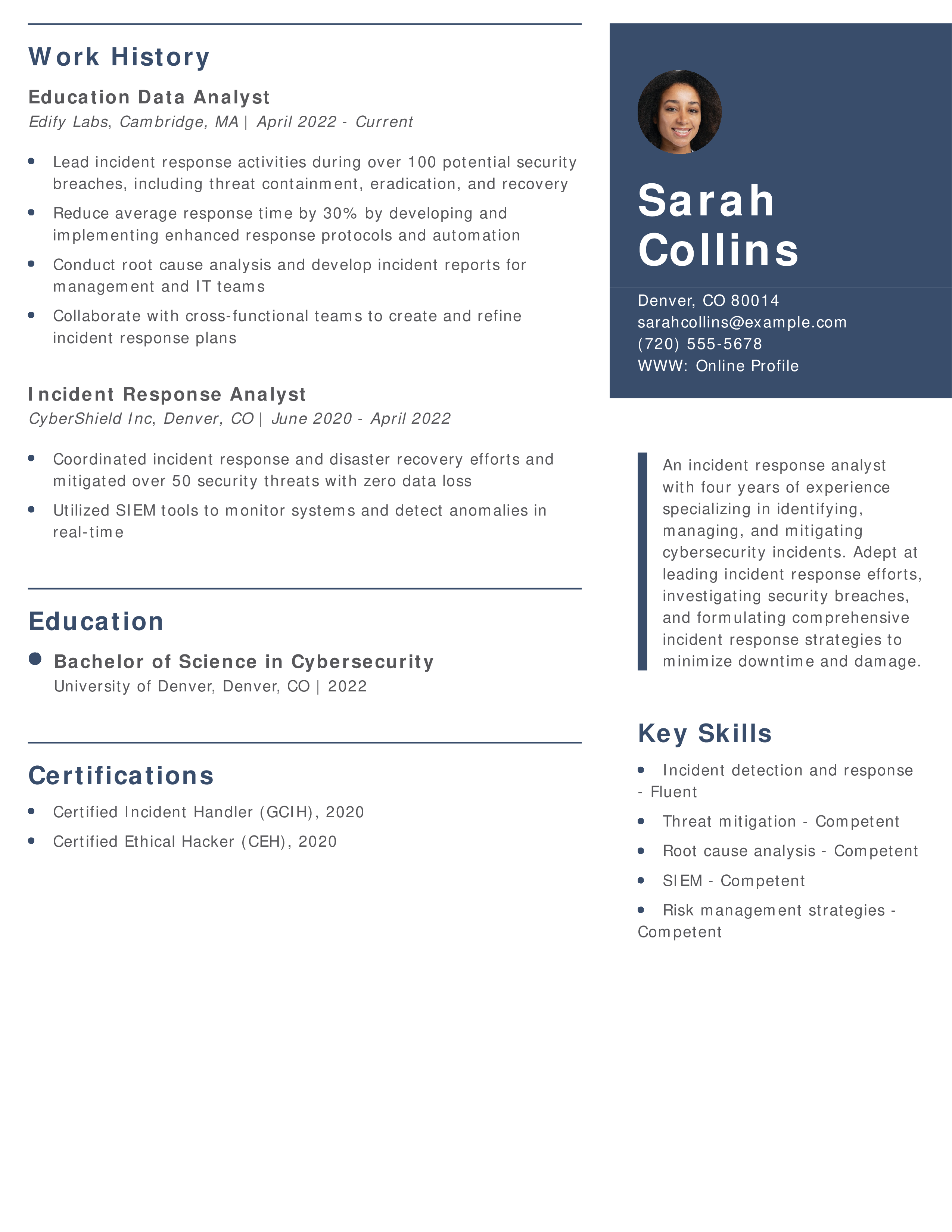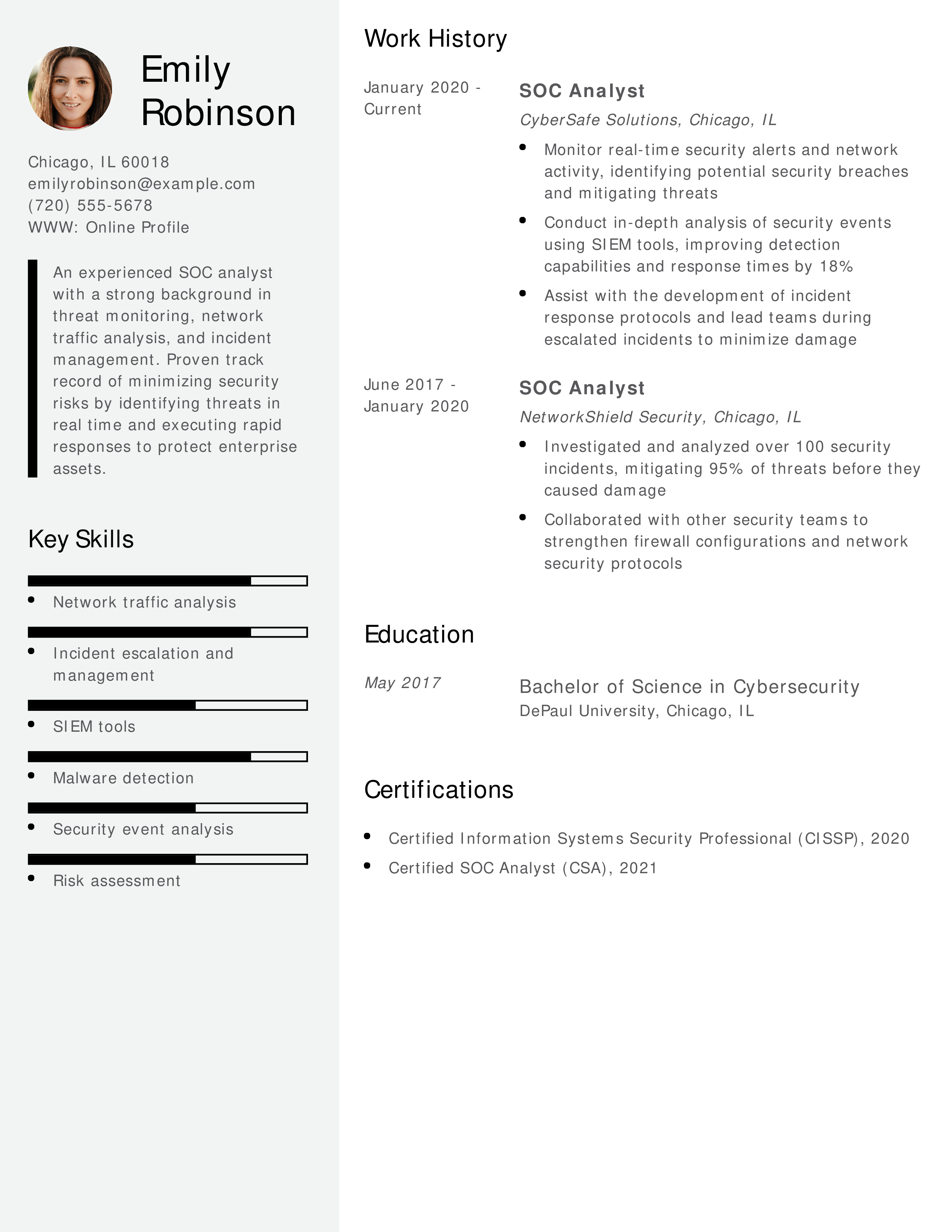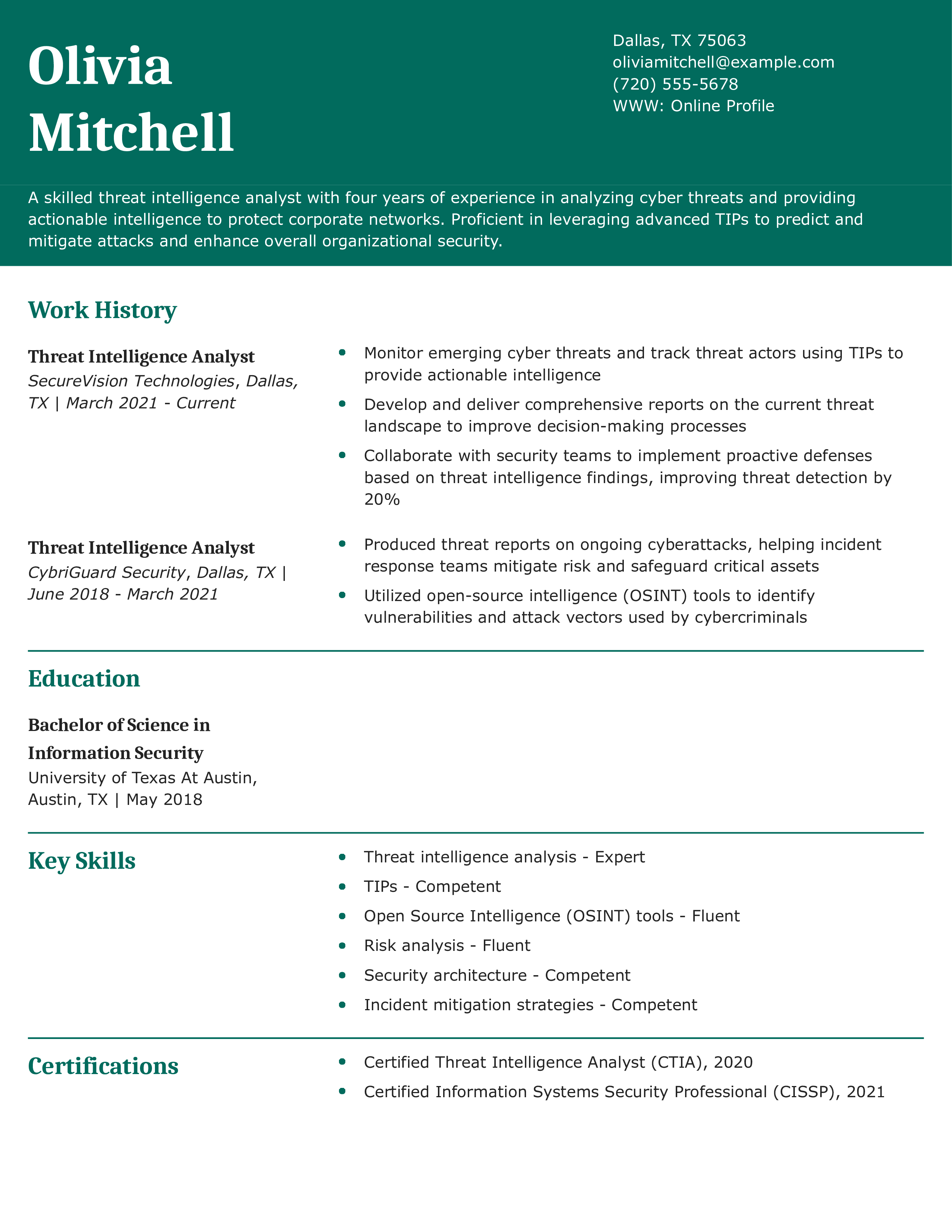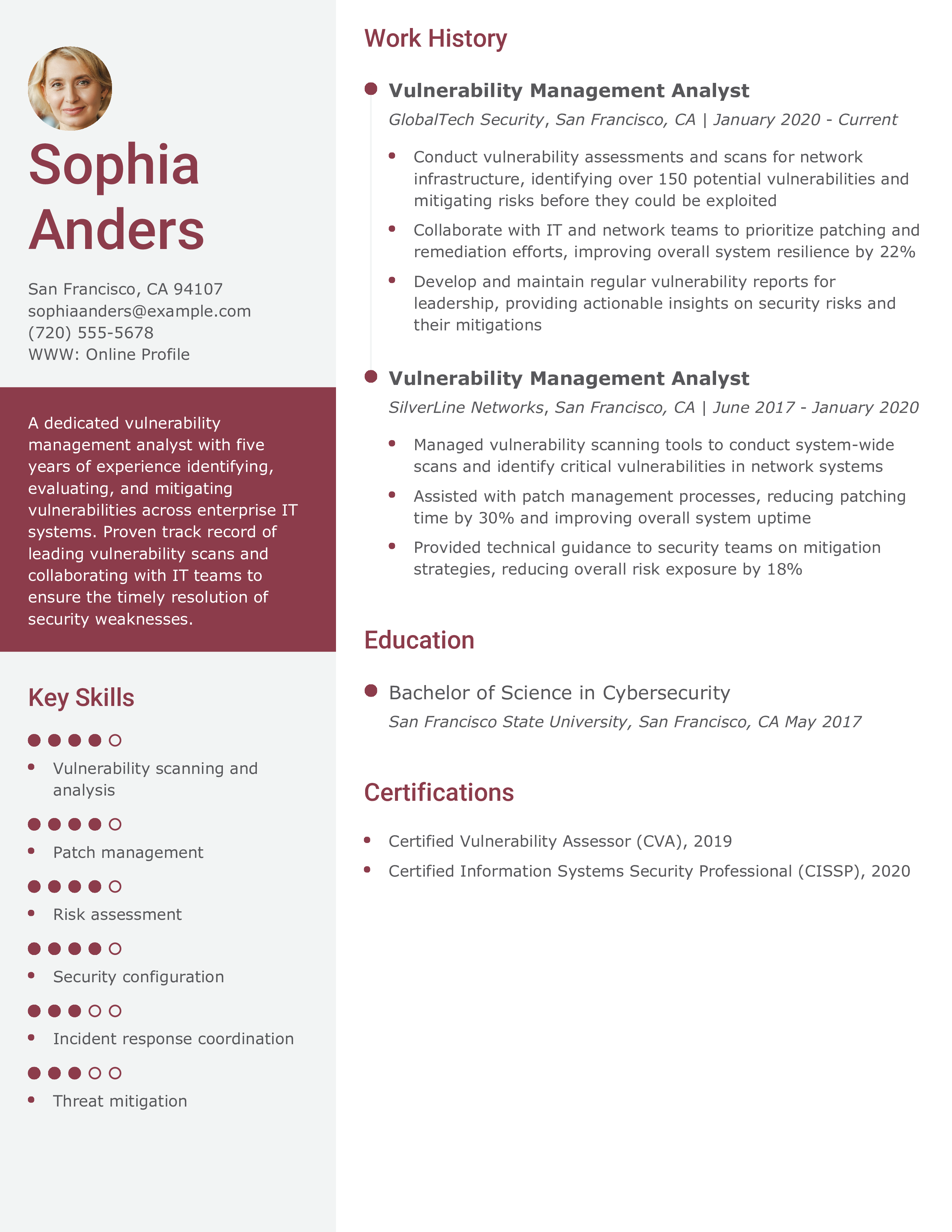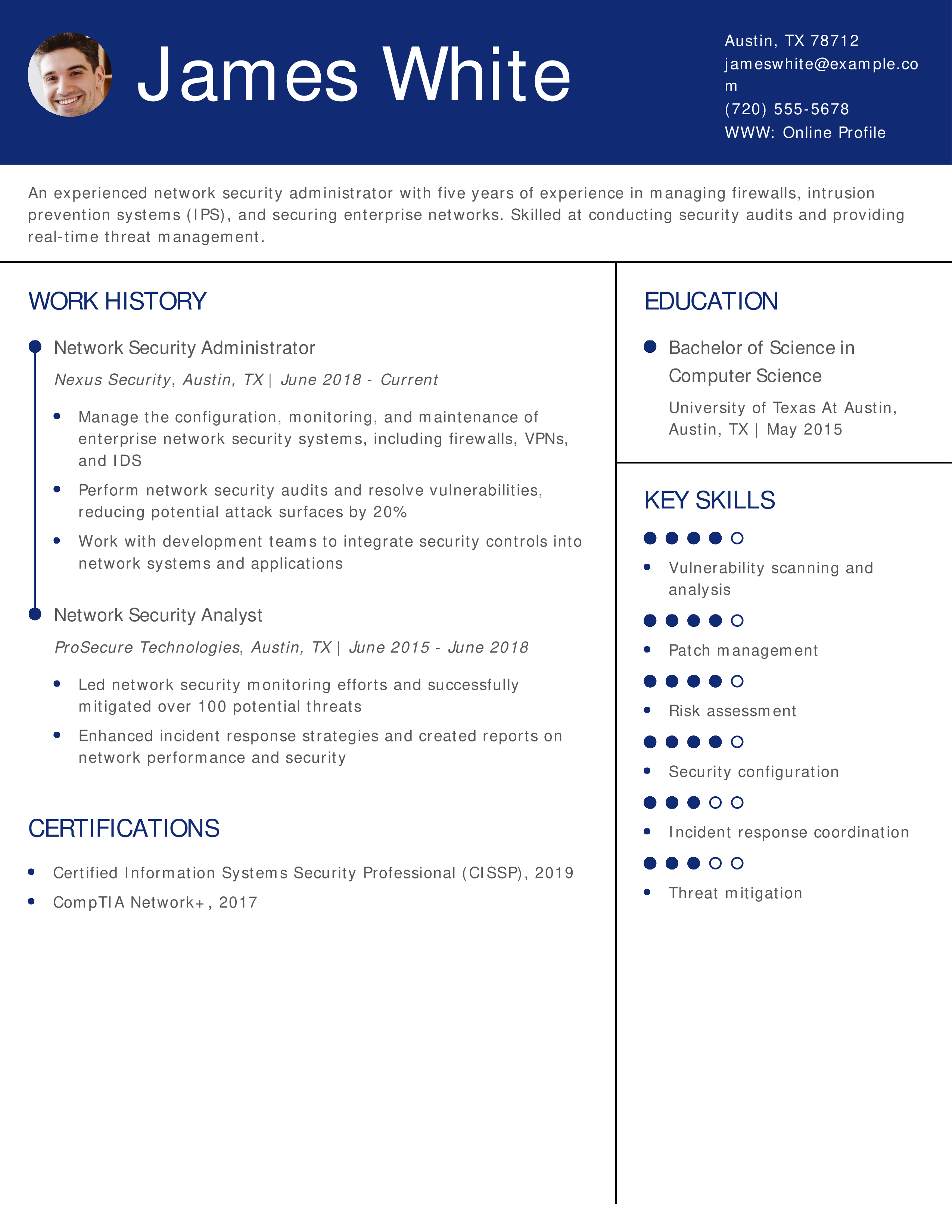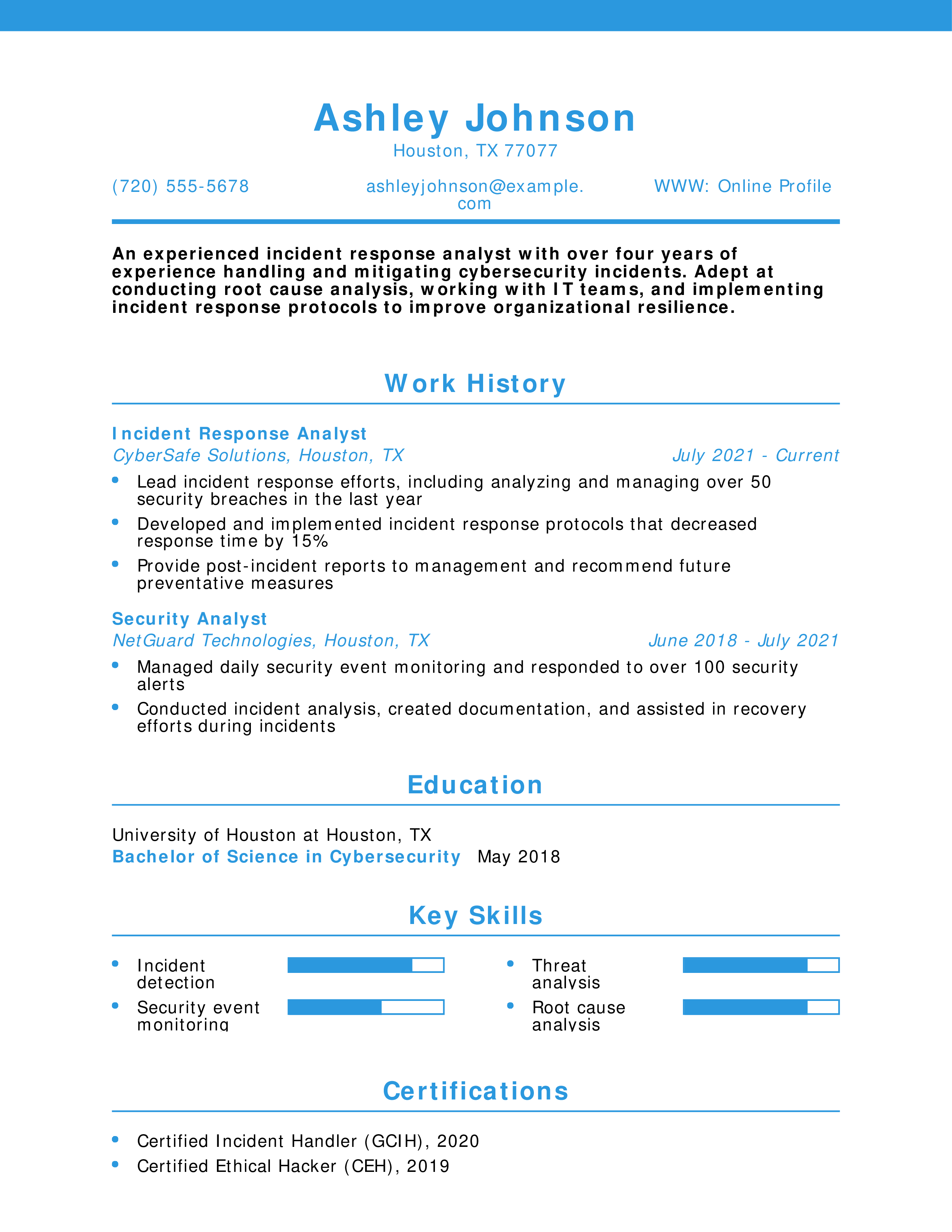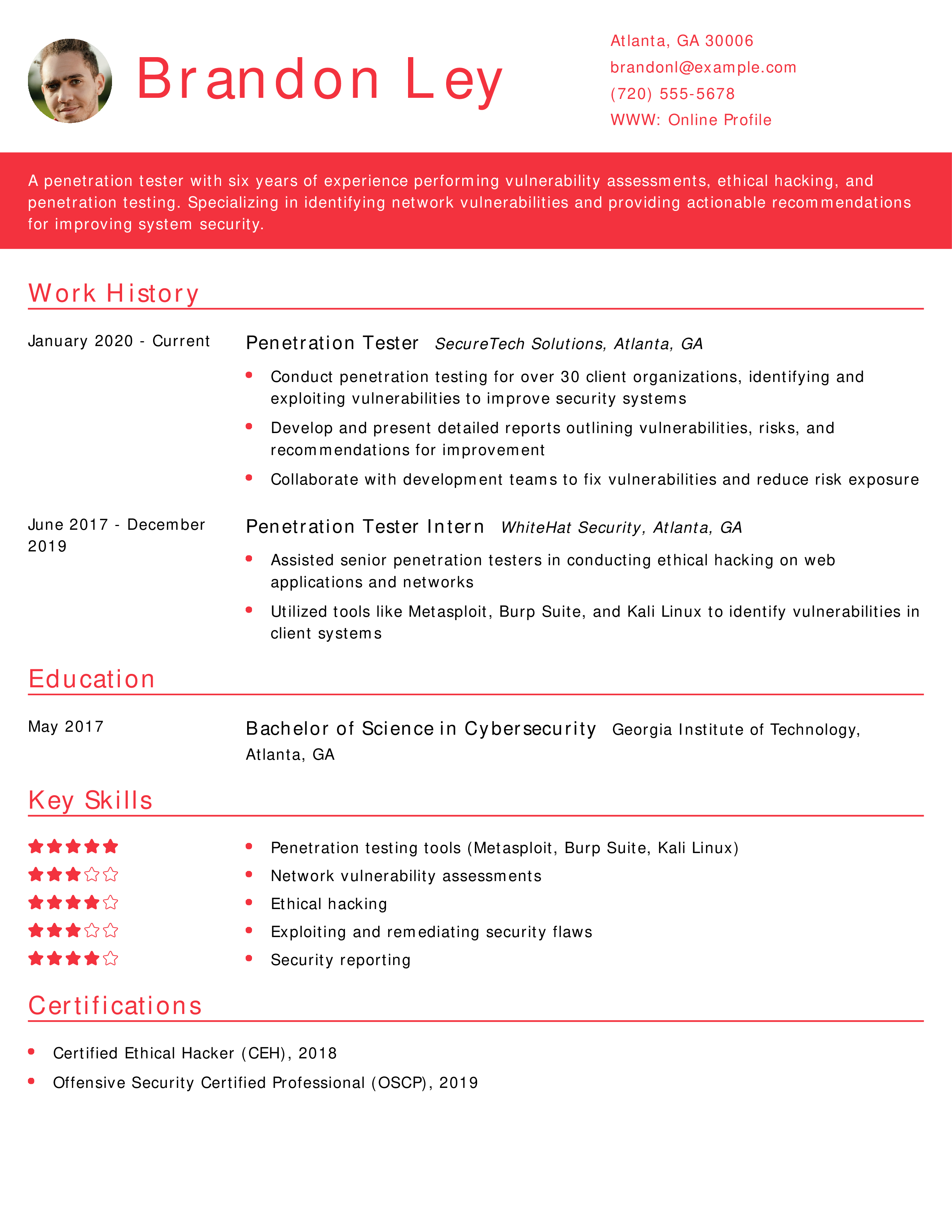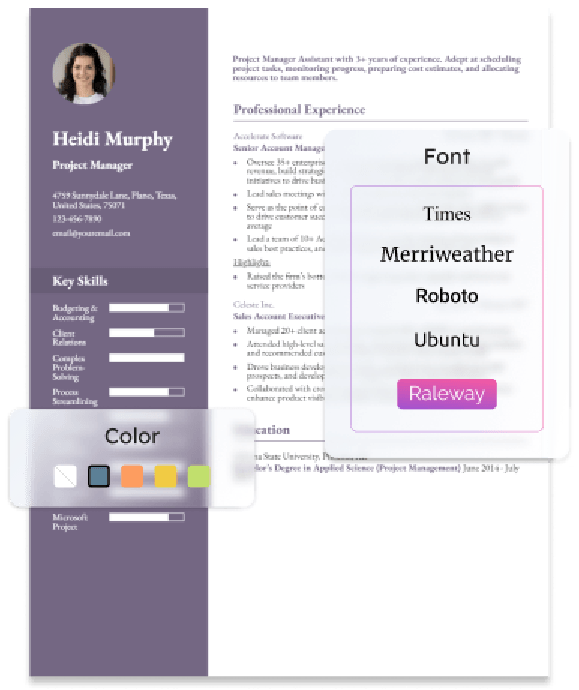John Smith
(123) 456-7890
[email protected]
LinkedIn | Portfolio
Philadelphia, PA 12345
Profile
A certified cybersecurity analyst with entry-level experience, specializing in network security, vulnerability assessments, and penetration testing. Adept at implementing security protocols and monitoring systems for potential threats.
Professional Experience
Cybersecurity Intern, Cadence Health Care, Redmond, WA
June 2023 – August 2024
- Supported initiatives to secure enterprise networks by configuring firewalls and conducting regular vulnerability scans
- Collaborated with senior analysts to develop custom security protocols and improve network security
- Participated in a major incident response to mitigate a phishing attack
Key Skills
- Vulnerability assessments
- Penetration testing
- Network monitoring
- Encryption technologies
- Risk management
- Incident response
Education
Bachelor of Science (B.S.) Cybersecurity, University of Maryland Global Campus, Adelphi, MD | 2023
Certifications
- Certified Information Systems Security Professional (CISSP), (ISC)², 2024
- CompTIA Security+, CompTIA, 2023
Aliya Jackson
(123) 456-7890
[email protected]
LinkedIn | Portfolio
New York, NY 12345
Profile
An information security manager with 10 years of professional experience specializing in AI, disaster recovery, and incident response. A strong history of leading high-performing technical teams to develop and implement AI-powered cybersecurity solutions.
Professional Experience
Information Security Manager, Morgan Cybersecurity Inc., New York, NY
July 2019 – present
- Lead a cybersecurity team comprised of 10 analysts and engineers to implement cloud security and AI-powered security solutions for three enterprise businesses, resulting in a 24% increase in response times
- Perform comprehensive security audits and collaborate cross-functionally with IT, data privacy, and legal teams to refine protocols and policies based on findings
- Presented vulnerability assessments, diagnose and mitigate potential threats, and successfully reduce security incidents by 19%
Information Security Analyst, Starlight Security Inc., New York, NY
June 2014 – July 2019
- Coordinated with a team of analysts to conduct security audits, perform vulnerability assessments, and protect sensitive patient data for a major health care organization
- Conducted comprehensive security audits and identified opportunities to enhance protocols and access management controls, contributing to a 10% reduction in incidents
Key Skills
- Cloud security
- Security architecture design
- Incident response
- Disaster recovery planning
- ISO 27001/27002
Education
Bachelor of Science (B.S.) in Cybersecurity, University of Maryland Global Campus, Adelphi, MD | May 2014
Certifications
- Certified Information Systems Security Professional (CISSP), (ISC)², 2016
- Certified Ethical Hacker (CEH), EC-Council, 2015
- Certified Information Security Manager (CISM), ISACA, 2014
Joseph Corbin
(123) 456-7890
[email protected]
LinkedIn | Portfolio
Seattle, WA 98101
Profile
An accomplished cybersecurity engineer with seven years of experience specializing in cloud security, vulnerability assessments, and disaster recovery. A proven track record of collaborating with cross-functional teams to enhance security protocols and improve incident response for enterprise financial companies.
Professional Experience
Cybersecurity Engineer, Coulsen Financial, Redmond, WA
January 2020 – present
- Lead the implementation of robust cloud security systems, conduct vulnerability assessments, identify potential threats, and introduce enhanced security protocols to reduce system vulnerabilities by 27%
- Manage incident response during security breaches, mitigate damage, and implement new disaster recovery procedures to protect critical financial data
- Collaborate with cross-functional teams to upgrade security protocols and software, enhancing system resilience against advanced persistent threats (APT)
Information Security Analyst, Hayden Finance, Seattle, WA
June 2017 – December 2019
- Utilized cybersecurity frameworks such as ISO 27001 to enhance the company’s security posture, reducing security incidents by 18%
- Developed and maintained security scripts in Python and Java to automate critical security processes and improve operational effectiveness
- Managed intrusion detection systems, identified and mitigated potential security threats, and developed enhanced security protocols
Key Skills
- Cloud security
- Security architecture design
- Incident response
- Disaster recovery planning
- ISO 27001/27002
Education
Bachelor of Science (B.S.) in Cybersecurity, University of Maryland Global Campus, Adelphi, MD | May 2017
Certifications
- Certified Information Systems Security Professional (CISSP), (ISC)², 2019
- Certified Ethical Hacker (CEH), EC-Council, 2018
- Certified Information Security Manager (CISM), ISACA, 2018
Melissa Anderson
(123) 456-7890
[email protected]
LinkedIn | Portfolio
123 W Adams Ave, Detroit, MI 12345
Profile
A Cyber Security Analyst with eight years of professional experience specializing in information security, disaster recovery, incident response, and vulnerability assessment. A strong history of enhancing security protocols and mitigating the risk of cyber threats for large organizations.
Professional Experience
Senior Cyber Security Analyst, Avion Pharmaceuticals Inc., Detroit, MI
October 2016 – Present
- Manage a 15-person cyber security team to monitor attacks, unauthorized access, and suspicious activity impacting sensitive information, patents, and products for a multi-million-dollar pharmaceutical corporation
- Conduct root cause analysis for unauthorized access attempts, create security logs, and develop new information security management policies to reduce the risk of intrusion
- Liaise with data privacy, legal, IT management, and compliance departments to assess findings of security audits and restructure policies to preserve data integrity
Cyber Security Analyst, DoorDash, Detroit, MI
May 2014 – October 2016
- Conducted cyber security audits and investigations into fraudulent activities impacting Dasher direct, including unauthorized user access and theft
- Coordinated with the IT Department to develop and implement new cyber security procedures to ensure the security of dasher funds and account access
Education
Bachelor of Science (B.S.) Computer Science, University of Michigan, Detroit, MI | September 2010 – May 2014
Key Skills
- Information Security Management
- Threat Detection
- Risk Management
- Security Investigations
- User Authentication
Certifications
- Certified Information Systems Security Professional (CISSP), 2016
- Certified in Risk and Information Systems Control (CRISC), 2015
- CompTIA Security+, 2014
Jessica Morrison
(123) 456-7890
[email protected]
LinkedIn | Portfolio
123 Your Street, Philadelphia, PA 12345
Profile
A Senior Information Security Analyst with 10+ years of experience within the healthcare industry, specializing in SIEM, cybersecurity, and security assessments. A strong history of leading cloud deployments and security assessments to ensure confidentiality and integrity of patient data for large hospitals and healthcare organizations.
Professional Experience
Information Security Analyst, Penn Medical Center, Philadelphia, PA
October 2016 – Present
- Provide subject matter expertise to project teams for cloud and on-site deployments, including developing system security plans, conducting testing on security controls, and performing vulnerability assessments to ensure HIPAA compliance
- Partner with technology teams to enhance access management protocols and improve the user experience for 500+ employees
- Coordinated with data governance teams to ensure confidentiality of medical records, including leading the implementation of new security protocols
Information Security Analyst, Jefferson University Hospital, Philadelphia, PA
May 2014 – October 2016
- Oversaw all aspects of network security, threat prevention, and incident reporting systems, identified root causes of security threats and intrusions
- Delivered training to 100+ team members on security protocols and best practices, which included creating training materials and assets
Education
Bachelor of Science (B.S.) Computer Science, Drexel University, Philadelphia, PA | September 2010 – May 2014
Key Skills
- Cybersecurity
- HIPAA Compliance
- Network Security
- Threat Prevention
- PCI Compliance
Certifications
- Certified Information Systems Auditor (CISA), 2019
- Certified Information Systems Security Professional (CISSP), 2019
- CompTIA Security+, 2014
Michael Thompson
(123) 456-7890
[email protected]
LinkedIn | Portfolio
Chicago, IL 60601
Profile
A threat intelligence analyst with five years of experience in gathering, analyzing, and interpreting threat data. A proven track record of anticipating and mitigating future cyberattacks by analyzing emerging security threats and vulnerabilities. Adept at using intelligence platforms and producing actionable reports to improve organizational security postures.
Professional Experience
Threat Intelligence Analyst, SecureShield Inc., Chicago, IL
June 2019 – present
- Gather and analyze cyber threat intelligence from various open and closed sources to anticipate potential attacks
- Produce threat intelligence reports for security teams to enhance threat mitigation strategies, contributing to a 15% reduction in average response times
- Use threat intelligence platforms (TIPs) to monitor and track threat actors and campaigns
- Collaborate with IT and security teams to develop proactive security measures based on emerging threat data
Threat Intelligence Analyst, SecureShield Inc., Chicago, IL
June 2019 – present
- Identified and mitigated over 30 zero-day vulnerabilities by providing actionable intelligence to the incident response team
- Improved the organization’s threat detection capabilities through enhanced threat intelligence sharing
Key Skills
- Cyber threat analysis
- TIPs
- Risk assessment and threat modeling
- Vulnerability analysis
- Data analysis and reporting
- Incident prevention strategies
Education
Bachelor of Science (B.S.) – Information Security, University of Illinois, Chicago, IL | June 2017
Certifications
- Certified Threat Intelligence Analyst (CTIA), 2021
- Certified Information Systems Security Professional (CISSP), 2019
David Green
(123) 456-7890
[email protected]
LinkedIn | Portfolio
Phoenix, AZ 85001
Profile
A security operations center (SOC) analyst with three years of experience in real-time threat detection and incident management. Adept at utilizing SIEM tools to monitor network traffic, detect anomalies, and escalate incidents. A strong history of working within SOC environments to ensure the continuous security of IT systems and data.
Professional Experience
SOC Analyst, GlobalTech Solutions, Phoenix, AZ
May 2022 – present
- Monitor network activity using SIEM tools to detect and respond to security threats in real time, resulting in a 17% reduction in incident response times
- Analyze security logs and alerts to identify, escalate, and resolve potential incidents
- Conduct investigations of security alerts and provide recommendations for threat mitigation
- Collaborate with incident response teams to manage and resolve escalated security incidents
SOC Analyst, GlobalTech Solutions, Phoenix, AZ
June 2021 – May 2022
- Detected and escalated over 100 security incidents, preventing multiple data breaches
- Improved threat detection capabilities through the optimization of SIEM rules and processes, resulting in a 12% reduction in security breaches
Key Skills
- SIEM monitoring and analysis
- Threat detection and response
- Log analysis
- Incident escalation and management
- Network monitoring
- Malware detection and remediation
Education
Bachelor of Science (B.S.) – Information Technology, Arizona State University, Phoenix, AZ | May 2019
Certifications
- Certified Information Systems Security Professional (CISSP), 2021
- Certified SOC Analyst (CSA), 2021
Jessica Moore
(123) 456-7890
[email protected]
LinkedIn | Portfolio
San Francisco, CA 94105
Profile
A results-driven vulnerability management analyst with four years of experience conducting vulnerability assessments and managing patching processes. Adept at using vulnerability scanning tools to identify security weaknesses and working closely with IT teams to ensure timely patch management and mitigation of risks.
Professional Experience
Vulnerability Management Analyst, DataSecure Inc., San Francisco, CA
August 2022– Present
- Conduct vulnerability scans on network infrastructure and applications to identify security weaknesses
- Collaborate with IT teams to prioritize and apply patches to mitigate identified vulnerabilities
- Reduce incident response times by 18% by leading the implementation of new security protocols and vulnerability scanning
Vulnerability Management Analyst, Heartland Data Protection, San Francisco, CA
June 2020 – August 2022
- Perform risk assessments to determine the potential impact of vulnerabilities on business operations
- Provide regular reports on the organization’s vulnerability status and recommend mitigation strategies
- Implement a patch management process that reduced patching time by 25%
Key Skills
- Vulnerability scanning and analysis
- Patch management
- Risk assessment
- Penetration testing
- Security configuration
- Incident response coordination
Education
Bachelor of Science (B.S.) – Cybersecurity, San Francisco State University, San Francisco, CA | June 2018
Certifications
- Certified Vulnerability Assessor (CVA), 2020
- Certified Information Systems Security Professional (CISSP), 2019
Kevin Turner
(123) 456-7890
[email protected]
LinkedIn | Portfolio
Los Angeles, CA 90001
Profile
A proactive incident response analyst with over 5 years of experience in responding to security breaches, conducting forensic investigations, and managing cybersecurity incidents. Skilled in developing incident response plans and leading recovery efforts to minimize impact and downtime.
Professional Experience
Incident Response Analyst, ResponseGuard Technologies, Los Angeles, CA
July 2020 – Present
- Spearhead incident response efforts during security breaches, reducing average downtime by 40%
- Analyze system logs and identify vulnerabilities to improve security protocols and enhance the company’s defense posture
- Train junior analysts and IT staff on best practices for incident management and root cause analysis
Incident Response Analyst, DigitalGuard Security, Los Angeles, CA
June 2017 – July 2020
- Led response to critical security incidents and breaches, managing team coordination and response strategies
- Developed detailed incident reports and root cause analyses, contributing to improved security policies across the organization
Key Skills
- Incident detection and response
- Forensic analysis
- Security protocols
- Root cause analysis
- SIEM tools
- Cybersecurity defense strategies
Education
Bachelor of Science (B.S.) – Cybersecurity, University of Southern California, Los Angeles, CA | May 2017
Certifications
- Certified Incident Handler (GCIH), 2020
- Certified Ethical Hacker (CEH), 2019
Ethan Davis
(123) 456-7890
[email protected]
LinkedIn | Portfolio
Chicago, IL 60601
Profile
A skilled penetration tester with 4 years of experience performing vulnerability assessments and ethical hacking to identify system weaknesses. Adept at using various penetration testing tools to simulate cyberattacks and provide organizations with actionable intelligence to fortify security defenses.
Professional Experience
Penetration Tester, RedTeam Cybersecurity, Chicago, IL
February 2020 – Present
- Conduct penetration testing on enterprise networks, web applications, and APIs, identifying over 50 vulnerabilities and working with development teams to patch them
- Simulate cyberattacks using Kali Linux, Metasploit, and Burp Suite, resulting in a 30% improvement in the client’s vulnerability management program
- Develop detailed penetration testing reports, outlining findings, exploitability, and remediation strategies for stakeholders
Penetration Tester Intern, Hacktivist Security, Chicago, IL
June 2018 – February 2020
- Assisted senior penetration testers in conducting assessments for various web applications and network infrastructures
- Utilized tools like Nmap and Wireshark to conduct vulnerability scans and document weaknesses in client systems
- Worked with development teams to implement patching and preventive security measures
Key Skills
- Ethical hacking
- Vulnerability assessments
- Penetration testing tools (Metasploit, Burp Suite, Kali Linux)
- Web application testing
- Network security
- Reporting and documentation
Education
Bachelor of Science (B.S.) – Information Security, University of Chicago, Chicago, IL | May 2018
Certifications
- Certified Ethical Hacker (CEH), EC-Council, 2019
- Offensive Security Certified Professional (OSCP), 2020
Liam Turner
(123) 456-7890
[email protected]
LinkedIn | Portfolio
Boston, MA 02110
Profile
A seasoned network security administrator with 6 years of experience in securing, managing, and maintaining enterprise-level networks. Proven track record of improving network performance, enhancing security protocols, and mitigating potential threats before they materialize.
Professional Experience
Network Security Administrator, HyperNet Security, Boston, MA
January 2021 – Present
- Manage and monitor enterprise network security systems, including firewalls, VPNs, and intrusion detection systems, ensuring 99.9% uptime for critical business applications
- Develop and implement security policies and procedures, resulting in a 20% reduction in security breaches
- Provide training to IT staff on network security best practices and ensure all systems comply with industry regulations
Network Security Administrator, CloudShield Networks, Boston, MA
June 2016 – December 2020
- Led the redesign of network architecture for clients, enhancing security measures and improving system performance by 25%
- Monitored network traffic for unusual activity, identified threats, and implemented security measures to prevent breaches
- Collaborated with external vendors to integrate new security tools, increasing system resilience against DDoS attacks
Key Skills
- Network security monitoring
- Firewall and VPN management
- Intrusion detection and prevention
- Security policy development
- Risk management
- Security incident response
Education
Bachelor of Science (B.S.) – Information Technology, Boston University, Boston, MA | May 2016
Certifications
- Certified Information Systems Security Professional (CISSP), 2018
- Certified Network Defense Architect (CNDA), 2019
Daniel Walker
(123) 456-7890
[email protected]
LinkedIn | Portfolio
Austin, TX 73301
Profile
A cloud security engineer with 5 years of experience securing cloud-based environments, managing cloud infrastructure, and mitigating potential threats. Adept at designing and implementing cloud security architectures to safeguard enterprise systems against attacks.
Professional Experience
Cloud Security Engineer, CloudSec Solutions, Austin, TX
June 2020 – Present
- Design and implement cloud security solutions for clients, ensuring the protection of critical data across multiple cloud platforms
- Work with development teams to integrate security into the CI/CD pipeline, reducing security vulnerabilities in applications by 35%
- Conduct security assessments and audits to ensure compliance with security regulations, reducing the risk of data breaches
Cloud Security Engineer, SecureCloud Networks, Austin, TX
May 2017 – June 2020
- Managed cloud infrastructure for clients, securing data with encryption and monitoring tools to prevent unauthorized access
- Designed disaster recovery protocols for cloud-based systems, ensuring the availability of data in the event of an incident
- Trained and supported cross-functional teams in cloud security best practices and protocols
Key Skills
- Cloud security architecture
- Cloud infrastructure management
- Encryption technologies
- Disaster recovery planning
- Threat detection and mitigation
- Cloud compliance (GDPR, HIPAA, etc.)
Education
Bachelor of Science (B.S.) – Cybersecurity, University of Texas, Austin, TX | May 2017
Certifications
- Certified Cloud Security Professional (CCSP), 2019
- Certified Information Systems Security Professional (CISSP), 2020
James Roberts
(123) 456-7890
[email protected]
LinkedIn | Portfolio
Chicago, IL 60601
Profile
An IT security consultant with 6 years of experience advising organizations on strategies to enhance their cybersecurity posture. Expertise in risk assessment, threat analysis, and developing customized security solutions for enterprise clients.
Professional Experience
IT Security Consultant, SecureIT Solutions, Chicago, IL
March 2020 – Present
- Conduct comprehensive risk assessments and vulnerability assessments for enterprise clients, providing actionable solutions to mitigate identified threats
- Develop and implement customized security protocols, reducing security incidents by 22%
- Train client teams on best practices in cybersecurity and incident management, improving overall security awareness
Security Consultant, Digital Defense Consultants, Chicago, IL
June 2017 – March 2020
- Provided strategic cybersecurity consulting services to clients across industries, improving client security infrastructures and compliance with industry regulations
- Led security audits and assessments, identifying key vulnerabilities and recommending mitigation strategies
- Assisted in the development of disaster recovery and business continuity plans
Key Skills
- Risk management
- Vulnerability assessments
- Incident management
- Security protocol development
- Cybersecurity training
- Compliance and regulatory standards
Education
Bachelor of Science (B.S.) – Information Security, University of Illinois, Chicago, IL | May 2017
Certifications
- Certified Information Systems Security Professional (CISSP), 2019
- Certified Information Security Manager (CISM), 2018
Rachel Lee
(123) 456-7890
[email protected]
LinkedIn | Portfolio
Dallas, TX 75201
Profile
A network security engineer with 7 years of experience securing corporate networks, designing firewalls, and managing intrusion detection systems. Strong track record in building secure network infrastructures to prevent unauthorized access and protect sensitive data.
Professional Experience
Network Security Engineer, NetSec Solutions, Dallas, TX
September 2018 – Present
- Design, implement, and maintain secure network infrastructures for clients in the financial and healthcare industries
- Collaborate with cross-functional teams to deploy security solutions and reduce system vulnerabilities by 30%
- Perform vulnerability assessments and penetration testing to identify and mitigate risks
Network Security Engineer, CyberTech Corp., Dallas, TX
March 2015 – September 2018
- Managed firewalls, intrusion detection systems (IDS), and VPN configurations, ensuring maximum security for the organization’s network
- Conducted network audits, identified security risks, and implemented solutions to address potential breaches
- Developed and maintained security policies and procedures for incident management
Key Skills
- Network security architecture
- Intrusion detection and prevention
- Firewall management
- VPN configuration
- Penetration testing
- Risk assessment
Education
Bachelor of Science (B.S.) – Computer Science, University of Texas, Dallas, TX | May 2015
Certifications
- Certified Information Systems Security Professional (CISSP), 2017
- Certified Ethical Hacker (CEH), 2016
Andrew Bennett
(123) 456-7890
[email protected]
LinkedIn | Portfolio
Austin, TX 73301
Profile
A cloud security architect with 8 years of experience in designing secure cloud infrastructures, implementing encryption technologies, and mitigating cloud security risks. Proven success in managing multi-cloud environments and enhancing cloud security protocols.
Professional Experience
Cloud Security Architect, CloudGuard Technologies, Austin, TX
May 2020 – Present
- Design and implement secure multi-cloud infrastructures for large enterprise clients
- Integrate advanced encryption technologies to secure sensitive data and ensure compliance with regulatory standards
- Lead the development and execution of cloud security strategies, improving security posture by 40%
Cloud Security Consultant, SecureCloud Solutions, Austin, TX
June 2014 – May 2020
- Designed security architectures for cloud-based environments, ensuring seamless integration and minimal risk exposure
- Conducted security audits and developed mitigation strategies for cloud vulnerabilities
- Collaborated with development and operations teams to enhance cloud security protocols and prevent data breaches
Key Skills
- Cloud security architecture
- Multi-cloud environments
- Encryption technologies
- Cloud compliance (GDPR, HIPAA, etc.)
- Security auditing
- Risk management
Education
Bachelor of Science (B.S.) – Information Security, University of Texas, Austin, TX | May 2014
Certifications
- Certified Cloud Security Professional (CCSP), 2018
- Certified Information Systems Security Professional (CISSP), 2016
Michael Harris
(123) 456-7890
[email protected]
LinkedIn | Portfolio
Miami, FL 33101
Profile
A cybersecurity risk analyst with 4 years of experience in identifying and mitigating potential cyber risks for large organizations. Skilled in conducting risk assessments, vulnerability assessments, and incident response.
Professional Experience
Cybersecurity Risk Analyst, RiskGuard Solutions, Miami, FL
June 2020 – Present
- Perform risk assessments on enterprise IT infrastructure, identifying potential threats and proposing actionable remediation strategies
- Collaborate with senior management to create and implement risk management strategies, reducing risk exposure by 25%
- Conduct vulnerability assessments, penetration testing, and incident response procedures to ensure ongoing system security
Cybersecurity Analyst, SafeNet Systems, Miami, FL
January 2018 – June 2020
- Managed vulnerability scans, identifying over 100 vulnerabilities across the network infrastructure
- Provided incident response and threat mitigation recommendations, resulting in a 30% decrease in security incidents
- Trained teams on risk management protocols and security best practices
Key Skills
- Risk assessments
- Vulnerability scanning
- Incident response
- Cybersecurity frameworks
- Penetration testing
- Security policy development
Education
Bachelor of Science (B.S.) – Cybersecurity, Florida State University, Tallahassee, FL | May 2017
Certifications
- Certified Information Systems Security Professional (CISSP), 2020
- Certified Ethical Hacker (CEH), 2019
Emily Foster
(123) 456-7890
[email protected]
LinkedIn | Portfolio
San Diego, CA 92101
Profile
An experienced IT security manager with 9 years of experience overseeing large-scale IT security operations. Adept at managing teams, securing enterprise networks, and leading cybersecurity initiatives to reduce vulnerabilities and improve data security.
Professional Experience
IT Security Manager, SecureNet Technologies, San Diego, CA
January 2017 – Present
- Lead and manage a team of 15 cybersecurity professionals to oversee network security for a Fortune 500 company
- Implemented new security protocols that reduced cyber threats by 35% and improved overall system security
- Collaborate with stakeholders to ensure cybersecurity policies and procedures are followed
IT Security Analyst, CyberSecure Systems, San Diego, CA
June 2013 – January 2017
- Managed vulnerability assessments and incident response protocols, identifying and mitigating over 50 potential cyber threats
- Enhanced security infrastructure and contributed to a 20% reduction in overall system vulnerabilities
Key Skills
- Cybersecurity leadership
- Incident management
- Vulnerability assessments
- Security policy implementation
- Data protection
- Risk management
Education
Bachelor of Science (B.S.) – Information Systems, University of California, San Diego, CA | May 2013
Certifications
- Certified Information Systems Security Professional (CISSP), 2016
- Certified Information Security Manager (CISM), 2015
Sarah Collins
(123) 456-7890
[email protected]
LinkedIn | Portfolio
Denver, CO 80202
Profile
An incident response analyst with four years of experience specializing in identifying, managing, and mitigating cybersecurity incidents. Adept at leading incident response efforts, investigating security breaches, and formulating comprehensive incident response strategies to minimize downtime and damage.
Professional Experience
Incident Response Analyst, CyberGuard Solutions, Denver, CO
April 2022 – present
- Lead incident response activities during over 100 potential security breaches, including threat containment, eradication, and recovery
- Reduce average response time by 30% by developing and implementing enhanced response protocols and automation
- Conduct root cause analysis and develop incident reports for management and IT teams
- Collaborate with cross-functional teams to create and refine incident response plans
Incident Response Analyst, CyberShield Inc., Denver, CO
June 2020 – April 2022
- Coordinated incident response and disaster recovery efforts and mitigated over 50 security threats with zero data loss
- Utilized SIEM tools to monitor systems and detect anomalies in real-time
Key Skills
- Incident detection and response
- Threat mitigation
- Root cause analysis
- SIEM
- Risk management strategies
Education
Bachelor of Science (B.S.) – Cybersecurity, University of Denver, Denver, CO | May 2020
Certifications
- Certified Incident Handler (GCIH), 2020
- Certified Ethical Hacker (CEH), 2020
Juan Cooper
(123) 456-7890
[email protected]
LinkedIn | Portfolio
Austin, TX 78701
Profile
A dedicated cybersecurity analyst with over six years of experience specializing in threat intelligence, security monitoring, and incident management. Adept at utilizing a range of cybersecurity tools to prevent breaches and protect sensitive company data. Known for strong problem-solving skills and a proactive approach to risk management.
Professional Experience
Cybersecurity Analyst, SecureTech Solutions, Austin, TX
May 2021 – Present
- Lead threat-hunting activities, identifying and mitigating potential risks before they can cause system damage
- Utilize SIEM tools to monitor security alerts and network activity, reducing false positives by 30%
- Create and implement robust cybersecurity policies and procedures, significantly enhancing overall security posture
Cybersecurity Analyst, Fortress Security, Austin, TX
January 2018 – May 2021
- Managed incident response for security breaches, restoring system integrity and reducing downtime by 20%
- Conducted vulnerability assessments and penetration testing on enterprise networks, resulting in the identification and mitigation of critical threats
Key Skills
- Threat intelligence
- Incident management
- SIEM tools
- Vulnerability assessments
- Penetration testing
- Risk management
Education
Bachelor of Science (B.S.) – Information Security, University of Texas, Austin, TX | May 2017
Certifications
- Certified Information Systems Security Professional (CISSP), 2019
- Certified Ethical Hacker (CEH), 2018
Emily Robinson
(123) 456-7890
[email protected]
LinkedIn | Portfolio
Chicago, IL 60601
Profile
An experienced SOC analyst with a strong background in threat monitoring, network traffic analysis, and incident management. Proven track record of minimizing security risks by identifying threats in real time and executing rapid responses to protect enterprise assets.
Professional Experience
SOC Analyst, CyberSafe Solutions, Chicago, IL
January 2020 – Present
- Monitor real-time security alerts and network activity, identifying potential security breaches and mitigating threats
- Conduct in-depth analysis of security events using SIEM tools, improving detection capabilities and response times by 18%
- Assist with the development of incident response protocols and lead teams during escalated incidents to minimize damage
SOC Analyst, NetworkShield Security, Chicago, IL
June 2017 – January 2020
- Investigated and analyzed over 100 security incidents, mitigating 95% of threats before they caused damage
- Collaborated with other security teams to strengthen firewall configurations and network security protocols
Key Skills
- Network traffic analysis
- Incident escalation and management
- SIEM tools
- Malware detection
- Security event analysis
- Risk assessment
Education
Bachelor of Science (B.S.) – Cybersecurity, DePaul University, Chicago, IL | May 2017
Certifications
- Certified Information Systems Security Professional (CISSP), 2020
- Certified SOC Analyst (CSA), 2021
Olivia Mitchell
(123) 456-7890
[email protected]
LinkedIn | Portfolio
Dallas, TX 75201
Profile
A skilled threat intelligence analyst with four years of experience in analyzing cyber threats and providing actionable intelligence to protect corporate networks. Proficient in leveraging advanced TIPs to predict and mitigate attacks and enhance overall organizational security.
Professional Experience
Threat Intelligence Analyst, SecureVision Technologies, Dallas, TX
March 2021 – Present
- Monitor emerging cyber threats and track threat actors using TIPs to provide actionable intelligence
- Develop and deliver comprehensive reports on the current threat landscape to improve decision-making processes
- Collaborate with security teams to implement proactive defenses based on threat intelligence findings, improving threat detection by 20%
Threat Intelligence Analyst, CybriGuard Security, Dallas, TX
June 2018 – March 2021
- Produced threat reports on ongoing cyberattacks, helping incident response teams mitigate risk and safeguard critical assets
- Utilized open-source intelligence (OSINT) tools to identify vulnerabilities and attack vectors used by cybercriminals
Key Skills
- Threat intelligence analysis
- TIPs
- Open Source Intelligence (OSINT) tools
- Risk analysis
- Security architecture
- Incident mitigation strategies
Education
Bachelor of Science (B.S.) – Information Security, University of Texas, Dallas, TX | May 2018
Certifications
- Certified Threat Intelligence Analyst (CTIA), 2020
- Certified Information Systems Security Professional (CISSP), 2021
Sophia Anders
(123) 456-7890
[email protected]
LinkedIn | Portfolio
San Francisco, CA 94105
Profile
A dedicated vulnerability management analyst with five years of experience identifying, evaluating, and mitigating vulnerabilities across enterprise IT systems. Proven track record of leading vulnerability scans and collaborating with IT teams to ensure the timely resolution of security weaknesses.
Professional Experience
Vulnerability Management Analyst, GlobalTech Security, San Francisco, CA
January 2020 – Present
- Conduct vulnerability assessments and scans for network infrastructure, identifying over 150 potential vulnerabilities and mitigating risks before they could be exploited
- Collaborate with IT and network teams to prioritize patching and remediation efforts, improving overall system resilience by 22%
- Develop and maintain regular vulnerability reports for leadership, providing actionable insights on security risks and their mitigations
Vulnerability Management Analyst, SilverLine Networks, San Francisco, CA
June 2017 – January 2020
- Managed vulnerability scanning tools to conduct system-wide scans and identify critical vulnerabilities in network systems
- Assisted with patch management processes, reducing patching time by 30% and improving overall system uptime
- Provided technical guidance to security teams on mitigation strategies, reducing overall risk exposure by 18%
Key Skills
- Vulnerability scanning and analysis
- Patch management
- Risk assessment
- Security configuration
- Incident response coordination
- Threat mitigation
Education
Bachelor of Science (B.S.) – Cybersecurity, San Francisco State University, San Francisco, CA | May 2017
Certifications
- Certified Vulnerability Assessor (CVA), 2019
- Certified Information Systems Security Professional (CISSP), 2020
James White
(123) 456-7890
[email protected]
LinkedIn | Portfolio
Austin, TX 73301
Profile
An experienced network security administrator with five years of experience in managing firewalls, intrusion prevention systems (IPS), and securing enterprise networks. Skilled at conducting security audits and providing real-time threat management.
Professional Experience
Network Security Administrator, Nexus Security, Austin, TX
June 2018 – Present
- Manage the configuration, monitoring, and maintenance of enterprise network security systems, including firewalls, VPNs, and IDS
- Perform network security audits and resolve vulnerabilities, reducing potential attack surfaces by 20%
- Work with development teams to integrate security controls into network systems and applications
Network Security Analyst, ProSecure Technologies, Austin, TX
June 2015 – June 2018
- Led network security monitoring efforts and successfully mitigated over 100 potential threats
- Enhanced incident response strategies and created reports on network performance and security
Key Skills
- Network security monitoring
- Firewall configuration
- VPN setup and management
- Incident response
- Risk management
- Security audits
Education
Bachelor of Science (B.S.) – Computer Science, University of Texas, Austin, TX | May 2015
Certifications
- Certified Information Systems Security Professional (CISSP), 2019
- CompTIA Network+, 2017
Ashley Johnson
(123) 456-7890
[email protected]
LinkedIn | Portfolio
Houston, TX 77001
Profile
An experienced incident response analyst with over four years of experience handling and mitigating cybersecurity incidents. Adept at conducting root cause analysis, working with IT teams, and implementing incident response protocols to improve organizational resilience.
Professional Experience
Incident Response Analyst, CyberSafe Solutions, Houston, TX
July 2021 – Present
- Lead incident response efforts, including analyzing and managing over 50 security breaches in the last year
- Developed and implemented incident response protocols that decreased response time by 15%
- Provide post-incident reports to management and recommend future preventative measures
Security Analyst, NetGuard Technologies, Houston, TX
June 2018 – July 2021
- Managed daily security event monitoring and responded to over 100 security alerts
- Conducted incident analysis, created documentation, and assisted in recovery efforts during incidents
Key Skills
- Incident detection and response
- Threat analysis
- Security event monitoring
- Root cause analysis
- SIEM tools
- Risk management
Education
Bachelor of Science (B.S.) – Cybersecurity, University of Houston, Houston, TX | May 2018
Certifications
- Certified Incident Handler (GCIH), 2020
- Certified Ethical Hacker (CEH), 2019
Brandon Ley
(123) 456-7890
[email protected]
LinkedIn | Portfolio
Atlanta, GA 30301
Profile
A penetration tester with six years of experience performing vulnerability assessments, ethical hacking, and penetration testing. Specializing in identifying network vulnerabilities and providing actionable recommendations for improving system security.
Professional Experience
Penetration Tester, SecureTech Solutions, Atlanta, GA
January 2020 – Present
- Conduct penetration testing for over 30 client organizations, identifying and exploiting vulnerabilities to improve security systems
- Develop and present detailed reports outlining vulnerabilities, risks, and recommendations for improvement
- Collaborate with development teams to fix vulnerabilities and reduce risk exposure
Penetration Tester Intern, WhiteHat Security, Atlanta, GA
June 2017 – December 2019
- Assisted senior penetration testers in conducting ethical hacking on web applications and networks
- Utilized tools like Metasploit, Burp Suite, and Kali Linux to identify vulnerabilities in client systems
Key Skills
- Penetration testing tools (Metasploit, Burp Suite, Kali Linux)
- Network vulnerability assessments
- Ethical hacking
- Exploiting and remediating security flaws
- Security reporting
Education
Bachelor of Science (B.S.) – Cybersecurity, Georgia Institute of Technology, Atlanta, GA | May 2017
Certifications
- Certified Ethical Hacker (CEH), 2018
- Offensive Security Certified Professional (OSCP), 2019
